Schools and synagogues adapt Purim celebrations to Zoom
SHANNON LEVITT | MANAGING EDITOR
Renee Joffe had to do a double take when she walked into one of Congregation Kehillah’s classrooms recently. Preserved on the white board was a lesson about Tu B’Shevat — the students’ last pre-pandemic lesson.
“That blew my mind when I looked at the whiteboard, and I’m like, ‘Oh my God! That’s the last thing they taught in person,’” said Joffe.

Purim planning this year coincides with the first anniversary of COVID-19, and Joffe said seeing the remnants of that lesson left her with a “weird feeling” realizing that a year has already passed.
Typically celebrated with costumes and parades, this year Purim’s preparations may seem a bit subdued. But across Greater Phoenix, people are planning to keep things festive where they can.
Purim is a difficult holiday to do over Zoom, according to Rabbi Alicia Magal of the Jewish Community of Sedona and the Verde Valley. Other holidays can be adapted, but for Purim, “you need that raucous energy in a room looking at each other,” she said. Adapting that feeling to the small rectangle of a computer screen takes some doing.
“This year it’s about finding the essence of the Purim celebration and saying what’s really needed here,” Magal said. “Purim’s a little mad; it’s upside down and backwards,” (and in that vein she’ll write her name backwards on her Zoom screen). She’ll encourage her congregants to wear funny hats and unmute themselves at critical moments. There might not be groggers, but people can put beans in a tin can, bang a pot with a spoon or honk a horn. Magal has a wooden frog with a bumpy back that she will turn into a percussion instrument by gliding a stick over it.
She’ll choose sections of the megillah to chant, sections when people should

Phoenix-area residents start new businesses during pandemic

Arin Finger was ready for the biggest youth sports league season yet: 2,500 kids had jerseys and were assigned to different sports teams. They were on rosters and scheduled to compete. It was April of last year, just when the COVID19 pandemic began to wreak havoc and “everything came crumbling down.” Then, people wanted their money back.
“This is my sole source of income for my family,” he said. “I’m sitting in my office saying, ‘This is not going to work. I have to do something, and I have to do something fast.’”

Today, Finger still runs the i9 Sports Arizona franchise he started seven years ago, but he also sells wood-fired pizza from a pizza trailer. Business is going so well that he is looking to turn it into a franchise.

It’s no secret the pandemic devastated businesses across Greater Phoenix. Arizona had the fourth-highest rate of business closures in the country relative to the number of total businesses in the state between March and July of last year, according to a Yelp survey.
But Finger, like several people in the Jewish community, was able to change course by starting a new business since the pandemic started.
SEE PURIM, PAGE 2
Finger got the idea of operating a pizza truck after seeing one in a park in the Sky Crossing neighborhood. He asked a few questions of the pizza truck operator and learned business was booming. Finger knew his lead soccer instructor at i9, Codey Stetler, had a background in the culinary world and asked if
SEE BUSINESSES, PAGE 3
Celebrating Jewish holidays at home has silver linings
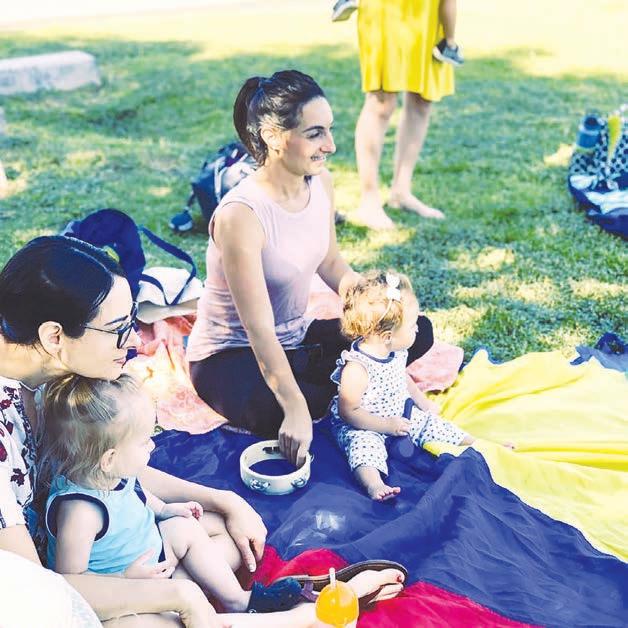
Na’amah Segal Karas lights Shabbat candles on Friday, Feb. 5, 2021. Since the pandemic started, she has become more observant. To read more, go to p. 19.

HOME DESIGN & REAL ESTATE | 16 SHORT-TERM RENTALS Community thinks through housing legislation FEBRUARY 19, 2021 | ADAR 7, 5781 | VOLUME 73, NUMBER 11 $1.50 HEADLINES | 8
THANK
Local teacher receives gratitude UAE swears in its first ambassador to Israel Israel, Cyprus announce ‘green passport’ travel agreement Dr. Fauci among seven laureates of 2021 Dan David Prize honoring public health NATIONAL INTERNATIONAL KEEP YOUR EYE ON jewishaz.com
BIG
YOU
NICOLE RAZ | STAFF WRITER
PHOTO BY BRADLEY KARAS
Marina Awerbuch sings Shabbat songs with her daughter, Sophie, to children ages 3 months to 5 years old at Cactus Park in Scottsdale, as part of a weekly Friday morning tot Shabbat.
ISRAEL
PHOTO BY REBECCA FEINMAN
make noise, sections when people should sing. The celebration will be scaled back, but she wants attendees to be fulfilled.
Meri Thomason, a congregant, chose Purim backgrounds for the congregation to use, making the Zoom megillah reading more festive. She plans to ask for donations of hamantaschen people make in their Purim baking class to include in a basket she’ll drop off for families. She might not be able to organize a synagogue-wide mishloach manot, but she wants “to do the mitzvah.”
This year, people will have to look for what’s underneath the carnival of Purim — with its hidden and revealed elements, said Magal. “Sometimes you have to look and find where God is in this place, this encounter when we’re no longer at the foot of Sinai with its thunder — but there are whispers of divinity that can be found at any moment. That is one of the good things about Purim.”
Last year’s Purim decorations were still up in the Hillel offices at Arizona State University, when Rabbi Suzy Stone, campus rabbi for Hillel at ASU, was finally allowed back in over the summer. “It looked like Pompei — a relic from before,” she said.

“Purim was the last in-person event last year, and it’s a huge event for us.”
Hillel’s Purim casino night is one of the largest flagship events of the year, a time when Jewish students — religious and secular — join together for an “amazing experience,” Stone said.
This year’s events will be virtual, but Stone feels good about the plans for a Purim festival week culminating in a virtual casino night. Even with students’ Zoom fatigue, she believes that the social nature of the event will re-create a lot of the same feelings students have about Purim in a normal year.
“We’re doing a lot more than we have in the past,” Stone said. “We have to be more creative in finding what makes Purim a celebration.”
The week includes an examination of the holiday, a gift basket delivery for about 200
students, a hamantaschen workshop with a chef and the big casino night replete with Purim shpiels, trivia, poker tables and other games.
Joshua Rips, one of Hillel at ASU’s Jewish Life interns, is in the midst of planning for the virtual casino night, which he hopes will bring people out who just want to relax.
He’s realistic about keeping things on Zoom for now. “I don’t foresee a future where we can go back to our ‘normal’ until the fall,” he said. “A stay-at-home Passover is going to be what the doctor ordered.”
“Having a celebration at all,” is what Cory Blumstein, Hillel at ASU’s vice president of Jewish Life, is looking forward to. He is ready to see all their hard work pay off, and expects it to go well simply because they’ve become much better at planning virtual events over the last year.
At Desert Jewish Academy, on the campus of Temple Beth Sholom of the East Vally, Emily Zappa remembered that Purim was the last in-person event before the campus became “a ghost town.”
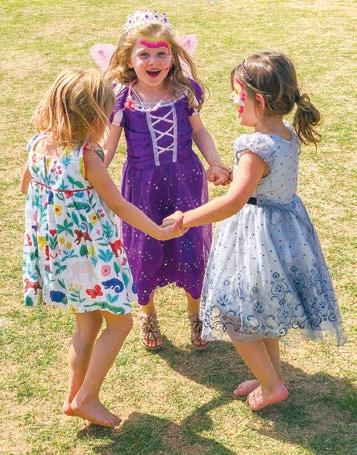
“It is pretty weird that it’s been a year,” she said, “but we’re pretty excited — anything to add some spice and something different to our kids’ days is fun.”
Normally, the students would collect items for mishloach manot baskets, but this year the staff is doing it, and they’ll put them in front of the school for people to pick up without having to enter the building.
2021 Phoenix Jewish News

Rabbi Tzvi Rimler, organizer of C’Teen, will help with the all-school Zoom holiday. Kids will dress up and show off their costumes, maybe learn a new song or two and play games, like Rimler’s creation “Jewpardy.”
“We’ll try to make it as fun as possible for everyone,” Zappa said.
At Congregation Beth Tefillah, Rabbi Pinchas Allouche is planning multiple services throughout the day and evening in order to accommodate in-person but socially distanced megillah readings.
Instead of passing out mishloach manot at the synagogue, he and others will take hamantaschen, food, costumes and games to congregants to “bring Purim joy to their homes.”
“Judaism doesn’t have to belong to the synagogue,” Allouche said. “It can and it should be brought home too.”
Before COVID, people felt that holidays had to be celebrated at the synagogue, he said. But the way COVID has turned the focus inward forces us to see things differently.
“There’s something special and intimate in bringing God home that we did not appreciate before.” JN
Print Dates
January 8
January 22
February 5
February 19
March 5
March 12
March 19
March 26
April 2
April 16
May 7
May 21
June 4
July 9
August 6*
August 20
August 27
September 3
September 10
September 24
October 1
October 15**
November 5
November 19
December 3
December 17
*Best
WWW.JEWISHAZ.COM
Monday-Thursday 8 a.m.-12:30 p.m. Friday
DEADLINES
EDITORIAL: Noon, Tuesday 9 days prior to publication
PUBLISHER
Jewish Community Foundation of Greater Phoenix

GENERAL MANAGER
Rich Solomon | 602.639.5861 rsolomon@jewishaz.com
MANAGING EDITOR Shannon Levitt | 602.639.5855 slevitt@jewishaz.com
STAFF WRITER Nikki Raz | 602.872.9470 nraz@jewishaz.com
ADVERTISING SALES CONSULTANT Jodi Lipson | 602.639.5866 jlipson@jewishaz.com


SUBSCRIPTIONS 602.870.9470 x 1 subscriptions@jewishaz.com
GRAPHIC DESIGNER Frank Wagner | 410.902.2300 ads_phoenixjn@midatlanticmedia.com
ADVERTISING: 11 a.m., Friday 3 days prior to publication
Jaime Roberts, Publisher | 2013-2016
Florence Newmark Eckstein, Publisher | 1981-2013
Cecil Newmark, Publisher | 1961-1981
Pearl Newmark, Editor | 1961-1981
M.B. Goldman, Jr., Founder | 1948-1961
PROUD MEMBER OF

2 FEBRUARY 19, 2021 JEWISH NEWS JEWISHAZ.COM
PURIM CONTINUED FROM PAGE 1 ©2021 Phoenix Jewish News, LLC, an asset of the Jewish Community Foundation of Greater Phoenix. Awards: Arizona Newspaper Association, Arizona Press Club, National Federation of Press Women, Arizona Press Women, American Jewish Press Association. Member: American Jewish Press Association, Jewish Telegraphic Agency, National Newspapers Association. Jewish News (ISSN 1070-5848) is published less than weekly, by Phoenix Jewish News, LLC, dba Jewish News. A subscription is $48 per year, payable in advance to Jewish News, 12701 N. Scottsdale Road., Suite 206, Scottsdale, AZ 85254, telephone 602-870-9470. Periodicals postage paid at Phoenix, Arizona. POSTMASTER: Send address changes to Jewish News, 12701 N. Scottsdale Road., Suite 206, Scottsdale, AZ 85254. VOL.73, NO. 11 | FEBRUARY 19, 2021 12701 N. Scottsdale Road, Suite 206, Scottsdale, AZ 85254 Phone: 602.870.9470 | Fax: 602.870.0426 | editor@jewishaz.com | advertising@jewishaz.com subscriptions@jewishaz.com | www.jewishaz.com HEADLINES 2 Local OPINION 10 Editorials Commentary TORAH COMMENTARY 12 SPECIAL SECTION: WONDERFUL WEDDINGS 13 SPECIAL SECTION: HOME DESIGN & REAL ESTATE 16 LIFESTYLES & CULTURE 19 COMMUNITY 21 Calendar Community Milestones OFFICE HOURS 8 a.m.-5 p.m.
Top Left: Photo courtesy of Emily Zappa | Top Right: Photo by Marina Awerbuch | Bottom Left: O cial White House photo
Hanks via JNS.org | Bottom Middle: Photo by Haim Zach /GPO via JNS.org | Bottom Right: Photo via Twitter/Dubai Media O ce via JNS.org
by Andrea
of Magazine **Annual Directory
PHOTO
Meri Thomason shows off her Purim costume in 2020.
COURTESY OF MERI THOMASON Children
play together at the Martin Pear JCC’s Purim parade a year ago.
PHOTO COURTESY OF MARTIN PEAR JCC
he’d be interested in starting a pizza business with him.
Soon after, Dough Riders was born. Finger offers a menu of 10 pizzas. from “Ricotta and lox” — which includes lemoncream ricotta, capers, smoked salmon, dill and arugula, to “Elote” featuring garlic oil, roasted corn, roasted poblano, bacon, cilantro, Mexican cheese and lime crema. Finger has been selling pizzas at the occasional private event, including bar mitzvahs and birthday parties, in addition to neighborhoods, breweries and farmers markets.
He thought the pizza trailer would be a side business to help him and his family get by during the pandemic, but it’s going better than he thought. Finger is excited for the return of festivals and events post-COVID. He’s already looking for three other franchise owners in Greater Phoenix, and his sights are set on expanding to the West Coast.

For Reut Oren and Orit Feinberg, former teachers at Pardes Jewish Day School, their pandemic-born businesses are a first foray into the business world.
“We are so artistic, and business and art, it’s... I don’t know, for me at least, they don’t really go together,” said Oren, a former drama therapist at Pardes.
Oren and Feinberg are in the process of setting up their company, Oops I Crafted. The pair, originally from Israel, have been making and selling DIY art kits since Chanukah.
Feinberg left teaching after 20 years due to concerns related to the pandemic, and Oren left in 2018 before her son was born.
“I was thinking about a business, and Reut was thinking about a business, and we bounced out ideas, and this was really something that incorporates everything for us — everything that we like to do, and we could do it from home and we know enough about it,” Feinberg said.
With everybody being home and needing something to do, Oren added, it seemed a good opportunity for DIY art kits. They work for couples, families and many kids can do them alone while parents work.
They’ve been selling string art, embroidery, bird feeder, and cookie decoration kits, as well as kits that cater to interfaith families. They are also preparing art kits for Purim, which include a kit to create mishloach manot. Kits range from $24 to $40 and can be delivered, shipped or picked up.

Diving into business has meant learning a lot of new things quickly. They’ve learned to define their audience, to communicate
the information customers want to know, such as which kits are appropriate for which age groups and the ins and outs of online shopping, Feinberg said. And now they’re learning marketing.
Already, they’ve learned to use social media such as Facebook and Instagram. Their next platform will be TikTok.
“My goal is to be the largest we can be,” said Feinberg. “For me, it’s a second career.”
Last March, Marina Awerbuch resigned from her full-time position as the program manager at the Childhelp Children’s Advocacy Center to spend time with her 3-year-old son and 6-month-old daughter. It was the same week COVID began to shut down the state.
She transitioned to a part-time role instead, wanting to have the opportunity to have fun with her kids and “live the mom life” that she couldn’t while working full time, she said.
“Then COVID hit and everything totally shut down,” she said. Like many other moms, she started doing arts and crafts and activities in parks. But she also came with a background in child development, had lots of supplies and was able to incorporate Jewish education.

On Fridays, she would hold a Shabbat experience for children of two friends she was already quarantining with. They would sing songs and play with a parachute.
She decided to expand the group of children and, in August, she let other Jewish moms know what she was doing. She felt seven to 10 kids would work. It started online but has since turned into a weekly tot Shabbat in the park.

For Rosh Hashanah she held her first paid event and promoted it on Instagram and Facebook. Next thing she knew, she was approached by Modern Milk, Musicology and PJ Library, all looking to create partnerships.
“I was just really doing it because I wanted something for my daughter,” she said, but after she started partnering with organizations she realized it could be more. “I saw that this is something that could make a profit as well as give me something to work on, and be with my kids.”
She hopes to partner with more agencies looking for children’s programming, and post-COVID she hopes to partner with coffee shops to create mommy-and-me crafts and coffee events.
“It kind of started from just Shabbat in the park, to me realizing it’s something I really love and enjoy doing — working with families and the kids,” she said. JN
BUSINESSES CONTINUED FROM PAGE 1 JEWISHAZ.COM JEWISH NEWS FEBRUARY 19, 2021 3 A Jewish Cemetery that cares about the Jewish Community • Jewish Owned and Operated • Sidewalks at Every Grave • Caring Professional Sta • Intermarried Families Welcome (480) 585-6060 24210 N. 68th Street, Phoenix (o Pinnacle Peak Rd) mtsinaicemetery.com @ Arizona’s Only Jewish Funeral Home @ Arizona’s Only Member of the Jewish Funeral Directors of America @ Arizona’s Only Jewish Owned & Operated Funeral Home @ Arizona’s Only Funeral Home Endorsed by the Entire Rabbinical Council 32nd St. & Camelback • Biltmore Plaza 602-957-1716 Hours: Mon.-Fri. 9:30 a.m.-5:30 p.m. Sat. 8 a.m.-1 p.m. (extended hours upon request) TAGER OPTICAL We are... – Not in every shopping center – Not on every corner – Never part of a large chain of stores – Not the “biggest, cheapest, or fastest” – Not like any other optical We can... – Often remember your name, and always greet you with a smile – Treat you like family – Take extra time – Special order just for you – Offer the highest quality, best service, honest, reasonable values & most beautiful selection of eyewear 42nd Anniversary Special! Please stop by and say hi to Bruce. While you’re here, meet Vince and Tara who will be carrying on Bruce’s legacy of excellent customer care. See Our Newest Arrivals From: Christian Dior • Jimmy Choo • Silhouette • Maui Jim Sunglasses Save 20% on complete pair of glasses with this coupon offer good thru March 31 2021
Codey Stetler, left, and Dough Rider Fire Crew Member Kaiea Burnz prepare 45, 12” wood-fired pizzas for a drive by birthday party in Glendale on Saturday, Feb. 13. PHOTO BY ARIN FINGER
Jewish community in Greater Phoenix pays tribute to Black History Month
NICOLE RAZ | STAFF WRITER
February marks Black History Month, and it’s important that Jews pay attention, said Paul Rockower, executive director of the Jewish Community Relations Council of Greater Phoenix. It’s important to “honor the struggle of the African American community,” he said, and to look back at our own history and connection to the community.
A photograph of Rabbi Abraham Joshua Heschel and Martin Luther King, Jr. marching from Selma to Montgomery, Alabama, in 1965 is often the symbol for the relationship between the Jewish and non-Jewish Black communities, but the relationship has changed over time.
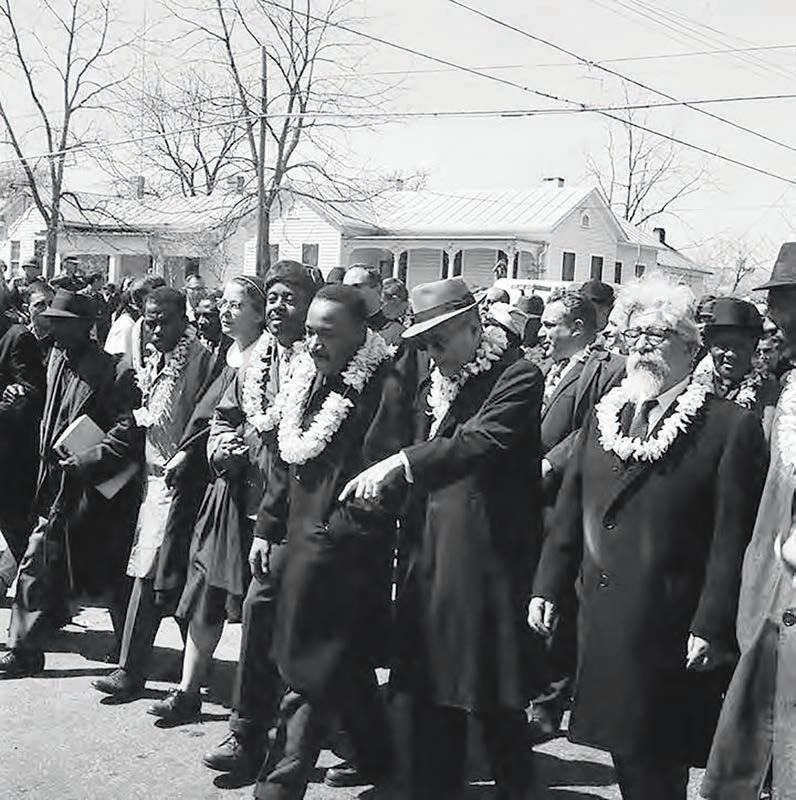
As part of his work with the JCRC, Rockower works to renew and strengthen ties. The Black community “stood by our side” after the 2018 Pittsburgh synagogue shooting, and Rockower said it’s important that the Jewish community is supporting the non-Jewish Black community in times of crisis as well. “How we get through these difficult times is through community connections and community support,” he said.
There are several events that represent those connections this month, including a free screening Saturday by the Greater Phoenix Jewish Film Festival.
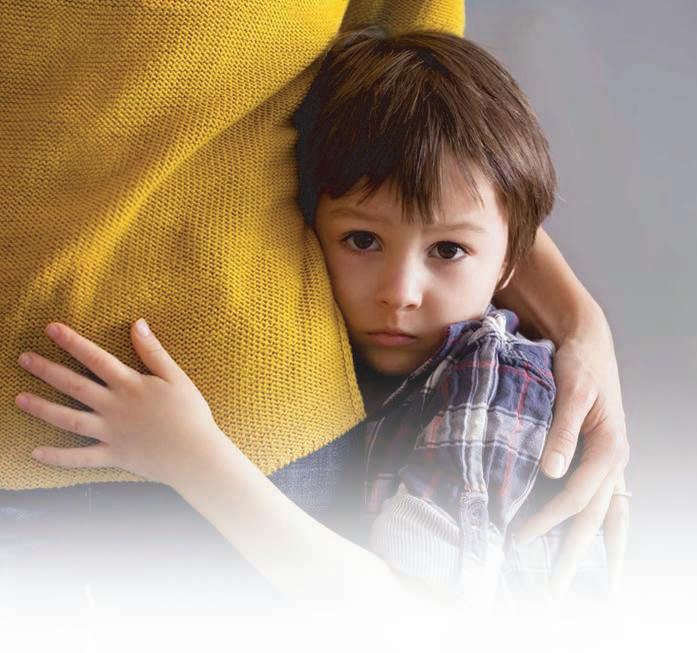


Acknowledging Black History Month is “even more important” this year, said Barry Singer, the festival’s co-executive director, noting the past year of protests against racial injustice and police brutality.
The free festival showing of “Shared Legacies: The African American-Jewish Civil Rights Alliance” is a nod to the Black Lives Matter movement and the shared history between the Jewish and non-Jewish Black communities, Singer said. The documentary explores historical lessons of African American and Jewish cooperation while fighting bias and racism.
Shari Rogers, the film’s director, told Detroit’s Jewish News in November that it is a critical time for members of the Jewish and non-Jewish Black communities to remember their alliance.
“We need to work together on today’s civil rights issues,” Rogers told the publication, noting the groups worked together to pass the Voting Rights Act of 1965. “The world is watching now
in regard to racism, and young Jews especially are asking, ‘How can I help?’ We have a template and a history of a powerful partnership.”
Arizona Jews for Justice launched a “Black and Jewish” dialogue series this
discussion this week called “Ending the School to Prison Pipeline,” which was the product of conversations and partnerships that formed in the wake of the killing of George Floyd in police custody in May 2020.
NCJWAZ and its event partners, Black Mothers Forum founder Janelle Wood and Joanie Rose, outreach director for Stand Indivisible, chose education as an avenue to begin their work together “because if you do not save the children,
The purpose of the series, is to help build bridges and “get to know each other.”
Ilana Bruce, who is Black and Jewish, attended this week’s discussion and sees it as a good first step in understanding each other’s needs.
She said the anti-Semitism she’s experienced in the Black community, and the racism she’s experienced in the Jewish community are proof that there is a lot of work to be done.
“We have so much common ground that needs to be brought to light,” she said, adding that common ground is not about “the oppression Olympics.” Rather, she said each group must acknowledge the other’s struggles and decide how, as allies, they can help each other prosper.
The National Council of Jewish Women of Arizona hosted a Black History Month
then you’re talking about a very bleak future,” said Civia Tamarkin, NCJWAZ president.
Tamarkin, Wood and Rose are now thinking about creating task forces to focus on specific areas of advocacy.
“The discussion was not intended to merely acknowledge Black history,” Tamarkin said, adding that Floyd’s death and the issues around it are a “community problem and tragedy that needed to be addressed, and early in the year so that we could begin to make changes.”
Ultimately, she hopes the NCJWAZ partnerships will bring diverse communities together to work for common goals, including fighting white supremacy.
“We are all facing the same stain on society today and against humanity,” she said. JN
HEADLINES
LOCAL 4 FEBRUARY 19, 2021 JEWISH NEWS JEWISHAZ.COM Change the life of a child in foster care. aask-az.org 2320 N 20th St, Phoenix, AZ 85006 For more information visit CreditsForKids.org or call 602-930-4665
Marchers on Sylvan Street in downtown Selma, Alabama, at the start of the Selma to Montgomery March on March, 21, 1965. The following leaders are on the front row, wearing leis: John Lewis, Ralph Abernathy, Martin Luther King Jr., Ralph Bunche, Rabbi Abraham Heschel, and F. D. Reese. Sylvan Street was later renamed Martin Luther King Street. ALABAMA DEPARTMENT OF ARCHIVES AND HISTORY. DONATED BY ALABAMA MEDIA GROUP. PHOTO BY WILLIAM MCCORMICK, HUNTSVILLE TIMES.
EVJCC offers virtual tours of Auschwitz
NICOLE RAZ | STAFF WRITER
Three years ago, Rabbi Michael Beyo, the East Valley Jewish Community Center’s CEO, traveled to Auschwitz in person. Last fall, he traveled there again — virtually.
The virtual tour was created by Jerzy Wojcik, who lives in Poland and has been a certified Auschwitz guide and educator for more than 14 years. The pandemic has halted travel and significantly impacted the number of people visiting the Auschwitz-Birkenau Memorial and Museum, and Wojcik wanted to ensure people could still experience it.
“Auschwitz education has to be continued,” Wojcik wrote in a Facebook post last July, when he also announced the formation of the virtual tours.
Since launching the project, Wojcik estimates he’s given 50 to 70 tours to people from all around the world. “I think virtual tours give a chance to tell the story of Auschwitz to a much greater and broader audience,” he said, noting that one of the tours was for a group of 250 students from India.
Beyo described the virtual tour as having an even greater impact on him than visiting in person. “Auschwitz-Birkenau is very sterile,” Beyo said. “It’s difficult to imagine that in that same room thousands of people were tortured. So it creates dissonance between what we know
from history and what your eyes and your senses experience.”
Wojcik conducts the tours in real time and uses preexisting digital resources, including the Auschwitz-Birkenau State Museum’s virtual reality panorama, archival historical footage and recordings from drone flights, to accompany his commentary. The tours also include an hour-long pre-tour seminar and a Q&A session.
Wojcik reached out to Beyo late last year to see if the EVJCC would be interested in partnering to promote the virtual tour in the United States and Canada. “I like the East Valley Jewish Community Center,” Wojcik explained. “What can I tell you?”
The EVJCC has a long history and high caliber of Holocaust education as well as established connections in the U.S. and Canada, said Beyo. “It’s easier for us to promote these tours than an individual person sitting in his office in Poland,” Beyo said.
In his first week of scheduling tours, Beyo said he has booked more than 20. The tour is available to groups with a minimum of 25 people, the cost is $30 per person and discounts are available for multiple tours and schools. The EVJCC is also developing partnerships with businesses that would like to participate or sponsor tours.
A group formed by the Arizona Center for the Blind and Visually Impaired will be going
on a tour March 2, and Steve Tepper, ACBVI’s executive director, was among several people Beyo invited on a VIP tour Feb. 7 to gauge interest.
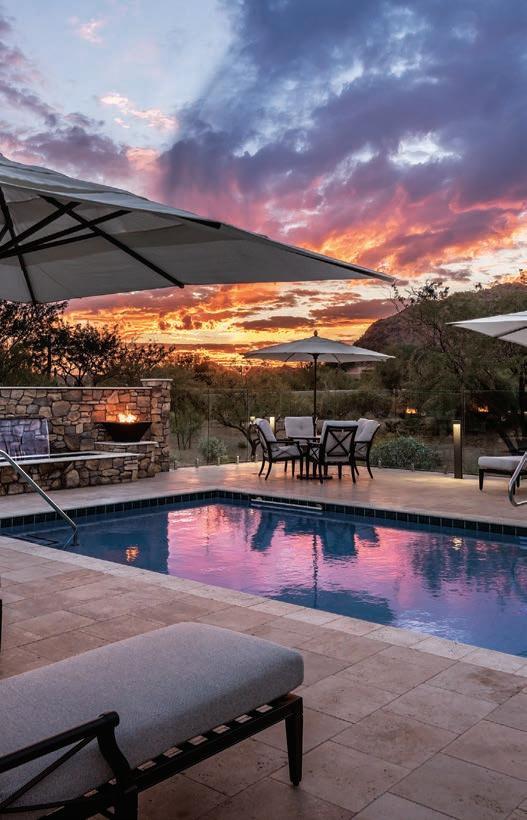
Tepper, though not visually impaired, said he knew the tour would work well for his group and clients because of its engaging audio elements and Wojcik’s willingness to provide even more description in his commentary to make accommodations.
“Having been to two concentration camps, nothing replaces that feeling that you get when you’re standing there,” Tepper said. “But I thought that the tour guide did an unbelievable job of describing where we were, the significance of where we were, and helping contextualize it for the group.”
The first day he sent invitations to board and staff members only, and he received more than 20 RSVPs.
“It hasn’t even gone out to clients yet,” he said. He is finding a lot of interest from people interested in learning more about the Holocaust with a desire to support agencies who are eager to accommodate the visually impaired.
Tepper is one of a few Jewish ACBVI board and staff members, and said there are lessons from the Holocaust for everyone. “One of the
stories of the Holocaust is around the bystander and the upstander. And there are multiple parallels to how that exists inside our population,” he said. “Our population on a daily basis is fighting for their ability, fighting for the right to fit into society.”
Now that Holocaust education will be added to the Arizona Department of Education’s administrative code, Beyo believes the virtual tour will become a “major program” to engage and educate the community.
“This is such a great opportunity to teach Holocaust education in general and specifically about Auschwitz, both during COVID, but also post-COVID,” Beyo said. “There are so many hundreds of thousands — or millions of people maybe — that would want to have that experience, but going to Auschwitz in Poland is not on their bucket list.” JN
The East Valley JCC will host two virtual Auschwitz tours in commemoration of Yom Hashoah. For more information, go to evjcc.org/Auschwitz-tour.

HEADLINES
LOCAL JEWISHAZ.COM JEWISH NEWS FEBRUARY 19, 2021 5 TROON, YOU HAVE A NEW NEIGHBOR LIKE NO OTHER MODERN AGING COMMUNITY YOU HAVE SEEN Welcome to ACOYA, a Modern Aging community of unparalleled amenities, concierge services and inspiring beauty. Live steps away from the Pinnacle Peak trailhead in one of the most majestic locales in Scottsdale. Take in spectacular views of the McDowell Mountains. Enjoy a cocktail around one of our outdoor fire pits. Indulge in dining that elevates the senses. Make your best move and discover ACOYA Troon, senior living reinvented! Call us today at (480) 660-6799. Due to COVID-19, we are operating within the CDC guidelines. LIFE IN THE KEY OF BEAUTIFUL ® INDEPENDENT LIVING • ASSISTED LIVING ACOYATROON.COM • 10455 E. PINNACLE PEAK PARKWAY, SCOTTSDALE, AZ 85255
View of Auschwitz on Aug. 14, 2018, the 77th anniversary of the Maximilian Kolbe's death.
PHOTO BY BIURO PRASOWE LICENSED UNDER CC PDM 1.0
Because having the confidence & peace of mind of accreditation is important. That’s why La Siena is accredited by CARF International–an independent organization that sets exceedingly high standards for care & service. We think you’ll find that our accreditation is only one of the many reasons to take a good look at La Siena.
Parents experiment with different options for Jewish learning
NICOLE RAZ | STAFF WRITER
This was upposed to be the year that Andrea Unger’s 6-yearold son, Casey, began his Jewish education.
“We always said we would join the temple when our oldest was starting kindergarten so that he could do Sunday school and Hebrew school, just like we did when we were growing up,” she said.
But the COVID-19 pandemic changed those plans. Casey started kindergarten in August, but not Sunday school. The Ungers are doing the best they can — continuing to read PJ Library books as a family, celebrating the major holidays, having a nice Shabbat dinner when it's possible — but virtual Sunday school didn’t seem like the right fit, so formal Jewish education is “on hold for now.”
When it comes to Jewish learning during a pandemic, parents across Greater Phoenix have had to decide what works. For some, like the Ungers, formal Jewish learning is on pause. For others, programming from various sources has helped to fill that gap.
Many families have been seeking out Jewish learning opportunities during the pandemic from PJ Library, which sends free books to families once a month to help them build a personal Jewish library and organizes family activities and events.

“That piece is missing for a lot of people right now and they want to keep that going,” said Marcy Lewis, PJ LibraryPhoenix’s program director. “And a lot of families don’t know how to do it.”
When Lewis organized a storywalk for Sukkot, turning the storyline of a PJ Library book into an interactive experience, she ended up providing six additional hours of the activity to meet demand, based on how quickly slots were filling up.
“I am hearing from parents that they want some tools to help them through this crazy time, and they still want to continue religiously,” Lewis said, adding that families are also looking for safe things to do together.
Jolene Kuty said Jewish education is just one of “all sorts of challenges” the pandemic has created for her five kids, ages 2, 5, 8, 10 and 13. They’ve been reading PJ Library books and participating in PJ Library activities, going to

outdoor services on Saturday mornings in person and attending the New Shul’s virtual Family Beit Midrash on Sunday mornings as well as classes through Lookstein Virtual Jewish Academy.

“We’re taking a course on the 10 commandments, and we get together on Zoom and talk about it, and then we do some independent work,” Kuty said. “It’s really easy and accessible.” She feels like her kids are getting the Jewish education they normally would, but it’s been a lot of work to re-create. “Normally, the systems are in place to create all of that,” she said.
Virtual options for Jewish learning are also still on the table for many families. Rabbi Zari Sussman, director of lifelong learning and engagement at Congregation Or Tzion, said most of the families who were enrolled pre-pandemic are still enrolled. They’ve even gained a few families.
“Our attendance has been better than normal Sunday school — I’m assuming because it’s just easier to log on and log off,” Sussman said. “We’ve had 60 to 70 children log on, which is more attendance than we would get in person.” Or Tzion offers Sunday school for kids in kindergarten through sixth grade and Hebrew school on Wednesdays for kids in third through seventh grade.
“I’ve been amazed by the parents’ commitment to Jewish education during the pandemic,” Sussman said. “This certainly was the year to let it go, and they didn’t.” JN
HEADLINES
LOCAL 6 FEBRUARY 19, 2021 JEWISH NEWS JEWISHAZ.COM
East Northern Avenue
LaSienaSeniorLiving.com • 602.635.2602 CARF-ACCREDITED INDEPENDENT & ASSISTED LIVING 2ND P LACE 2020READERS CHOICE
909
• Phoenix, AZ
Call us today to learn more.
Our assisted living is accredited for two reasons. You. And
your family.
The Gottlieb children, Tyler, 2, Gavin, 5, Scott, 8, Brynn, 10, and Ellie, 13, wear matching shirts that came with their PJ Library Chanukah activity bags in December 2020.
PHOTO BY JOLENE KUTY
Limmud AZ set for its first virtual event
 SHANNON LEVITT | MANAGING EDITOR
SHANNON LEVITT | MANAGING EDITOR
Meghan Jalowiec is still figuring out the ins and outs of Emamo, Limmud AZ’s scheduling software, and its annual day of learning on Feb. 21 is fast approaching. This year, the event will be virtual and, despite a year of experience with Zoom calls and online events, a few hiccups remain.
“We give patience to our participants and ask for patience from them,” said Jalowiec, one of Limmud’s three co-chairs. “Our community is very understanding and we appreciate that.”
So far, the event is on track to have similar participation rates as previous years. She’s happy with the numbers, but it’s not the most important thing.
“It’s great to have a large attendance, but if everyone has fun and learns something, that’s how we measure success,” she said.
Limmud AZ started in 2015 in response to the Greater Phoenix Jewish community’s desire for more learning opportunities and is part of a global network of learning conferences aligned with Limmud of North America. This year, speakers were invited instead of applying. The speakers — authors, educators, clergy and lay leaders — volunteer their time.
Rabbi Debbie Stiel of Temple Solel represents relatively new clergy, while Rabbi Dr. Shmuly Yanklowitz and Rabbi Pinchas Allouche are familiar veterans. Both are Orthodox, and Jalowiec said they’re always invited, given their eloquence in educating and engaging people from all walks of life about Judaism.
Amy Fish will talk about her personal development book, which isn’t typical Limmud fare. “But I really pushed for it because it’s part of a thread of standing up for yourself and for the downtrodden, which is a Jewish principle — so why not?” said Jalowiec.
This year, there will be 25 diverse lectures. The topics range from Yiddish children’s literature to a look at what the Talmud has to say about advocating for immigrants.
Yanklowitz, president and dean of Valley Beit Midrash, plans to talk about the public side of Judaism. While faith is personal, he said, “Judaism has universal moral teachings that when lived robustly can truly transform the world.”
He will touch on a variety of political issues. “The world is burning and we need to proudly and loudly amplify these beautiful central ethical teachings in society and in the world at large,” he said, via email.
e ort.
Center for Jewish Studies at Arizona State University, will talk about the connection between Judaism and ecology — something she’s been studying and writing about for two decades.
Judaism brings a distinctive approach to the issue, she said, and she will highlight Judaism’s “deep ecological wisdom” and how it can be applied to the climate crisis. She will also discuss how Judaism conveys the knowledge that all things “are deeply intertwined and interconnected.”
Vicki Cabot is speaking about issues surrounding the First Amendment and freedom of religion. She will focus on the role religion, specifically Judaism, plays in the public square.
To that end, she will introduce specific Supreme Court cases and go through the historic significance of each. She will examine details about how the courts are dealing with religious freedom in the face of COVID-19 and how some in the Jewish community view the public health issue as abrogating their freedom to gather for religious purposes such as with weddings and funerals.
She thinks people might have a lot to say given new interest in the Supreme Court in the wake of new judicial appointments. “It’s terrific that more people are keyed in to what the court does,” she said. “I’d just like to add something to the conversation.”

While she looks forward to the event, she will miss certain aspects of being in person. “The hardest thing for everybody is missing the conversation piece,” she said. “I want people to engage and express themselves, and I encourage people to participate.”
On a positive note, said Jalowiec, a virtual event allows people to attend from anywhere in the world. She isn’t certain how people will react, but she’s curious to see the comments come in. Right now, the plan is to be back in person for 2022, “but we’re open to feedback,” she said.
“If virtual is what the community wants going forward, we’ll listen.” JN
Registration is open until Feb. 21, the day of the event. For more information go to: limmudaz.org.
More clarity. More hearing. More life.
Introducing the new Oticon More™
● New research tells us the brain can handle access to the full sound scene to naturally make sense of sound1
● The Deep Neural Network in Oticon More gives your brain more of the information it needs to decipher the intricate details of relevant sounds
● Oticon More delivers 30% more sound to the brain and increases speech understanding by 15%2


The benefit is improved speech understanding with less listening e ort and the ability to remember more.
Get more out of life. Get more out of your hearing aid. Call to schedule your complimentary hearing assessment.* Upon completion, receive a $20 Gift Card.*
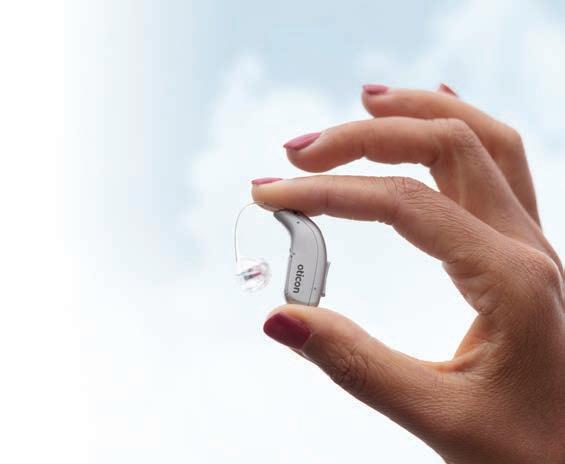
CASA
LOCATIONS)
social distancing. 1O’Sullivan, et al (2019). Puvvada, K. C., & Simon, J. Z. (2017). 2Compared to industry-leading Oticon Opn S™. *See o ce for details. †Risk-Free Trial begins on the date of purchase. If you are not completely satisfied, you can return it within the trial period for a full refund or exchange. Trial periods vary by state. See o ce for complete details and restrictions. This o er is available at most HearingLife o ces. Check with your local provider. O er expires 2/28/21. Information within this o er may vary or be subject to change.
HEADLINES
LOCAL JEWISHAZ.COM JEWISH NEWS FEBRUARY 19, 2021 7
with
understanding
New
Trained
12 million real-life sounds for better
with less
YOUR
TODAY!
SCHEDULE
RISK-FREE TRIAL†
WHEN CALLING, MENTION CODE AG60-1 TO RECEIVE YOUR OFFER GRANDE ● CHANDLER ● GLENDALE ● MARICOPA MESA ● PHOENIX ● SCOTTSDALE (4
888.280.7443 Ask about our special financing o er. hearinglife.com
Together
we will take these precautions: requiring face masks, asking pre-screening questions, performing temperature checks, sanitizing surfaces and practicing
Holocaust survivors get second vaccine at press conference

On Feb. 12, Sheryl Bronkesh, president of the Phoenix Holocaust Association, received her second COVID-19 vaccine alongside Rise Stillman and Frieda Allweiss, both Holocaust survivors. Initially, the three were scheduled to be vaccinated Monday, but their appointments were moved up by the Arizona Department of Health Services so the event could be broadcast live. Dr. Cara Christ, ADHS director, was on hand to vaccinate all three.
In January, Bronkesh worked with Rep. Alma Hernandez (LD-3), Kathy Rood, program manager for Jewish social services at Jewish Family & Children’s Service and Christ to assist Holocaust survivors and their spouses who were having troubles navigating the state’s website to book vaccine appointments. More than 40 survivors and their spouses have been vaccinated since last month.
“We do consider everybody over the age of 75 important, but we also know that these individuals are survivors of a very tragic situation,” Christ said. “We wanted to make sure that they were able to continue to survive in the face of another tragic situation.”
When Bronkesh let ADHS know she was being asked by multiple members of the press to allow survivors’ vaccinations to be filmed, the department facilitated the three appointments and held a press conference at which Christ, Bronkesh and the two survivors could speak and answer questions.
“Quite frankly, I’ve done a lot of speaking in my day but I have never faced that many cameras,” Bronkesh said. “Fortunately, I don’t have a fear of public speaking, but there were a lot of cameras.” Once Christ and Bronkesh spoke, Christ vaccinated the survivors and Bronkesh. While they waited 15 minutes to ensure there were no bad reactions, the survivors answered questions.
Since news broke of her work, Bronkesh has received several calls from people in other states looking to do the same thing for survivors. She is grateful for all the help she received, especially from Rood who is someone many survivors know and trust which makes the process easier.
“Kathy helped when I got overwhelmed and has been helping tremendously,” Bronkesh said of the more than 70 appointments they’ve made. “This has been a monumental amount of work.”
Local teacher honored for her efforts during pandemic
On Feb. 13, Emily Zappa, teacher and head of school at Desert Jewish Academy, received a special thank-you plaque and check for $250 from PayPal for being one of five local teachers who have made a positive impact on the community during a difficult year.
Jen Zak’s daughter, Zoey, is one of Zappa’s students at DJA, and when she discovered that her employer, PayPal, was looking for nominations of educators who had gone above and beyond during the pandemic, Zak asked her daughter for advice.

Zoey Zak responded immediately that it should be Zappa.
“She is a great teacher who loves all of her students,” she told her mother. “She stays calm in challenging situations.”
Zak, a single parent working from home, has been grateful over the past months to Zappa and the other teachers at DJA for providing enthusiastic and engaging lesson plans virtually.
“As a parent, I have admired her work to keep students safe, immediately shifting in light of rising cases with speed,” said Zak

PayPal’s “We Love Our Teachers” campaign is a way “ to show a small token of appreciation for those who have stood out to us and impacted our families and communities in a positive way amidst all those challenges,” said Ashley Ollie, community and employee engagement representative for PayPal, via email.
“We’re looking forward to putting a smile on Emily’s face and thanking her for the impact she has on our local families and the community.”
At Friday’s Zoom event, DJA teachers, students and administrators watched as Zappa was praised for her work and presented with a plaque and check for $250. “For being an awesome teacher,” was the message in the check’s memo line.
“Thank you so much,” said Zappa during the Zoom presentation. “I’m speechless.”

Zappa knew that she had been chosen before Friday, but the check and honorary plaque were a surprise. With tears in her eyes she thanked her “awesome” class. “It’s what I wake up to and look forward to,” she said about teaching her students.
“Let’s have a pizza party,” she laughed and thanked Zak, fellow teachers and PayPal. JN



BRIEFS
LOCAL 8 FEBRUARY 19, 2021 JEWISH NEWS JEWISHAZ.COM
jewishaz.com ◆ jewishaz.wordpress.com facebook.com/JewishAZ ◆ twitter.com/phxjnews instagram.com/phxjnews ◆ pinterest.com/jewishaz
Come socialize with us
Rise Stillman, a Holocaust survivor, receives her second COVID-19 vaccine from Dr. Cara Christ, director of Arizona Department of Health Services.
PHOTO BY SHERYL BRONKESH
You should know … Erika Neuberg
SHANNON LEVITT | MANAGING EDITOR
Erika Neuberg spent 25 years in private practice as a clinical psychologist before transitioning to a life-coaching practice three years ago. Over the course of her professional life she carefully honed her listening and negotiating skills. She now stands ready to use both as part of the Arizona Independent Redistricting Commission.
It’s been 10 years since the state’s congressional and legislative districts were drawn, and with new census figures being issued, Neuberg threw her hat in the ring to serve as the IRC’s independent chair. Along with two Republicans and two Democrats, she will draw new districts for the state determining how voters will be represented. She won her position with unanimous support, which could be a boon for her efforts in bridging the state’s political divide.
A political science major in college, Neuberg is also a student of history and recognizes that for democracy to thrive, voters need to feel secure that their voices will be heard. She is ready to foster consensus with her new colleagues as well as to listen closely to what the public has to add.
Neuberg spoke to Jewish News about what inspired her to get involved in the sometimes “full contact sport” of politics and how her background helps her to bring people together and find common ground.
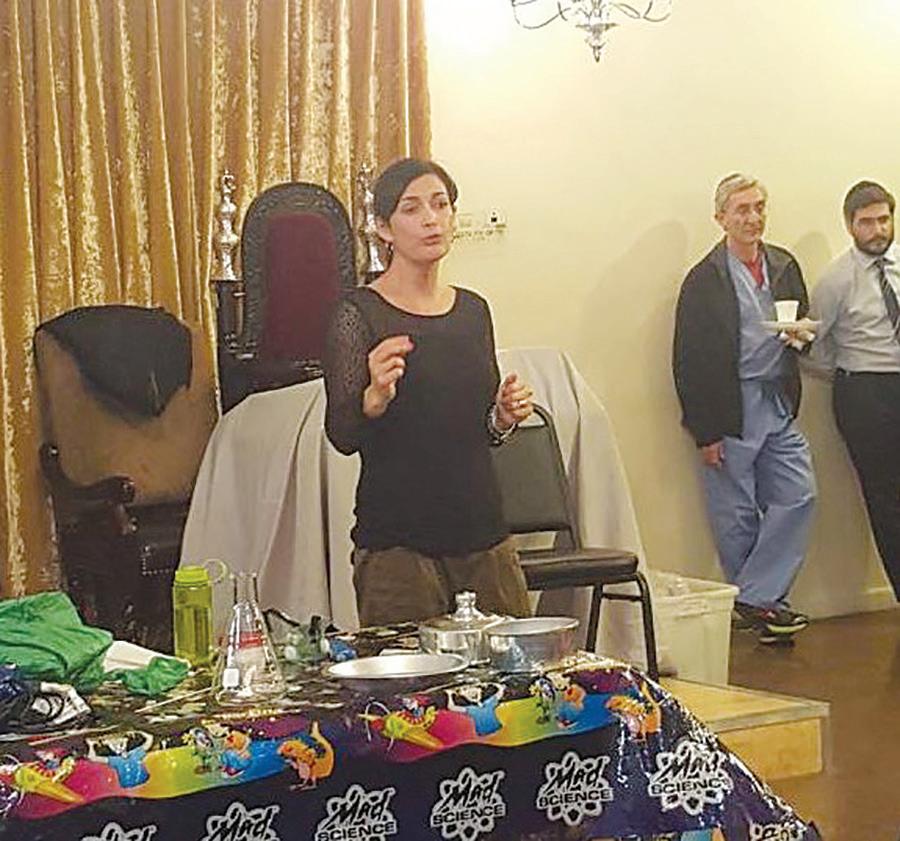
Why did you want to be involved in this process?
Over the last few years I have become increasingly concerned about the tone and tenor of our public discourse. I see a rise in identity politics, a rise of a tribal mentality, and I see less productivity and civility on Capitol Hill. I’m somebody who takes action when there’s something that concerns me. I began to think a year ago of what I can do to help the country that I love and that affords me so many freedoms.
I have particular political expertise of bringing Republicans and Democrats together and the redistricting process could use somebody who is truly independent and beholden to nobody, somebody genuinely committed to the common good, somebody with the skill sets to be resilient and fight through what is oftentimes a challenging, tense and mistrustful process.
I talked with a couple of people to get their perspective about ways I can make a difference and I got positive feedback from both the left and the right. They recommended I put myself up for service to the state.
What in your background gives you the confidence you can do this?
My psychological background has led me to have the skills to bring different groups of people together.
And I also credit the American Israel Public Affairs Committee. I ended up getting involved in AIPAC in my very early 20s as a way to
advocate for the US-Israel relationship that fit with my broader beliefs.
To help promote democracy and good things for the world, I spent over 30 years involved in AIPAC and pro-Israel politics — to some degree. It really trains people to stay laser-focused on a policy issue and to see things through a nonpartisan or bipartisan lens. It’s the combination of my psychological background and my experience with AIPAC that helps me work with everybody.
How can you ensure Arizonans that something as technical and consequential as redistricting will be a fair process?
We are going to make every effort to be as transparent and as accessible as possible. At every meeting so far we have been collecting public comments. We’re a little bit restricted right now with COVID and meeting virtually. We can’t have people come and publicly testify. But we’re tapping into a wide range of public opinion.
Shortly, we’ll begin to go out into the community and meet with all different communities of interest, all over the state, to understand their needs and their perspectives. You’re going to be talking to different communities?
We’re going to make sure that we’re meeting with rural communities that have very different needs, communities on the border that may have unique challenges and our tribal nations that have unique needs. Different religious groups may have different needs and different ethnic groups in our state need to have representation. There are different economic levels, and real urban blighted areas.
There’s no one agreed upon definition of what a community of interest is. And we will listen to all groups.
Do you have confidence you and your colleagues can effectively listen to so many disparate communities?
I am a good listener, and I will listen to feedback on the left, right and middle. With the open meeting laws in Arizona, we’re actually somewhat limited and I’m not able to really do much work directly with my commissioners behind the scenes at all. All work is done in the public eye. My skills will have to be used in those public meetings. I’ll try to keep the temperature down.
The commission that narrows down the applicants and selects the finalists did an excellent job of picking people. And the state leaders who picked the four other commissioners, my four colleagues, are people of great character and have a background of getting things done. They’re mature, seasoned people and I have a really good feeling about our ability to be collaborative and avoid some of the nastiness that can happen.
Politics is a full contact sport and these are very serious issues. We fully expect things to get heated, but I have a lot of confidence in the five of us that we are in it for the right reasons.
How can you improve upon the work of the previous commission?
I am deeply appreciative of the efforts of the previous commission. Ten years ago they worked very hard, but they struggled from the beginning because they didn’t all enter the process with the same vision in mind. The Arizona Constitution is very clear about our requirements for redistricting — it’s not open to personal interpretation. There’s a hierarchy: We’re first responsible to fulfill all voting acts and requirements, then we’re creating districts with equal population, then geographic compactness, then communities of interest, and the very last requirement — if all these other criteria were satisfied — we consider competitiveness of districts.
If you go back and really study the way they did their work, they didn’t see eye to eye on the constitutional priorities. I made it very clear how I interpreted the Constitution and how I would lead the process. Given that I was selected unanimously by the Commission on Appellate Court and unanimously by the four commissioners. I see that as collective bias that we’re all on the same exact mission.
At least we’re a little clearer about the rules that we’re going to follow.
How can you ensure transparency?
There’s an agenda that by law we’re required to put out to the public 48 hours in advance, and the public has an ability to know each and every week what topics are going to be discussed. And we’re limited to only discussing those items on the agenda so the public isn’t left out. They have the opportunity to participate as much as possible.
We want a transparent and accessible process. And I can be a helpful conduit to encourage the community to learn about our process and to engage in political expression and engage in government.
The process can get in the weeds, so how would you describe the big picture?
The basic foundation of democracy is representation of all different communities of interest. If the job isn’t done properly the people of our state won’t be adequately represented. That’s just foundational.
For me, the opportunity to serve my state that I love and believe in is an incredible honor. I encourage the entire community to learn about and be involved in the process and partake in American government. The more we understand and the more we do together, that helps break down barriers, because the process is bringing people together for a shared goal.
That’s something that can be really positive and exciting.
With all the recent political news and anxiety, do you feel added pressure?
This has to be done. Our mission is the same and is equally necessary whether there’s political drama out there or not. This is a process that’s just fundamental to democracy
and it’s best for us not to bring emotions into this process at all actually,
The more we apply data, facts, science and the Constitution and leave emotion out, we’ll get a better product.
The early months are focused on building the commission from the ground up really, it’s entirely independent so we’re addressing things like updating a website, finding office space, hiring our staff, those kinds of things. It’s going to be a little logistical for a while. We’ll also be hiring attorneys. A very important part of the process will be hiring mapping consultants.
Our hope is to have everything as organized and the infrastructure in place so that as soon as the census data comes out, we can hit the ground running. JN
ENGINEERS
IS SEEKING THE FOLLOWING ENGINEERING TALENT IN PHOENIX, AZ: TECHNICAL SPECIALIST, CAE NVH: Lead vehicle projects for NVH dev & analysis of full vehicle system and subsystems. Req’s Masters degree in Mech., Industr., Manuf., Structural Eng., or closely related w/ 2 yrs exp as a mech, NVH CAE or structural Engineer. Travel req’d.
SR. MATERIALS ENGINEER:
Responsibilities include material selection, development, & validation of materials for automotive application. Req’s Masters degree in material science, Chem. Eng, or closely related w/ 2 yrs exp in materials selection, validation, development, analysis, and reporting.
LEAD BODY CONTROLS ENGINEER:
Lead the body-controls software-dev team including task management, coordinating development needs, managing software releases, and providing technical leadership in software development using Simulink. Req’s Masters degree in Elec., Soft., Mech. or closely related w/ 2 yrs exp. or Bach. degree and 5 yrs exp. Travel req’d.
SEND TECHNICAL RESUME TO ATTN: HR, NIKOLA MOTOR CO., 4141 E BROADWAY ROAD, PHOENIX, AZ 85040
HEADLINES
LOCAL JEWISHAZ.COM JEWISH NEWS FEBRUARY 19, 2021 9
Beyond Donald Trump
Senate Minority Leader Mitch McConnell joined 42 other Republican senators in voting to acquit former president Donald Trump on the charge of incitement of insurrection. The 57-43 vote in the Senate failed to meet the two-thirds majority required, and Trump was acquitted in his second impeachment trial. But the theater didn’t end there. Nor do the consequences for Trump.
Shortly after casting his “no” vote, McConnell took the Senate floor. In a presentation that could have been co-written by the House managers, McConnell excoriated the former president, saying he was “practically and morally responsible” for the attack on the Capitol on Jan 6. McConnell went on to explain that he voted to acquit only because he does not believe that the Constitution permits the impeachment of a president who is no longer in office.
Reasonable people can debate the constitutionality of the impeachment effort, and even whether the Senate should have voted to convict. But it doesn’t really matter. The tightly orchestrated trial led by Rep. Jamie Raskin (D-Md.) was an overwhelming indictment of Trump, beginning with evidence that made clear (in McConnell’s words) “the intensifying crescendo of conspiracy theories orchestrated by an outgoing president who seemed determined to either overturn the voters’ decision or else torch our institutions on the way out.”
The House managers painted a vivid picture — aided in part by the selfie-happy mob — of how close members of Congress and the vice president came to the guns, baseball bats and bear spray carried by the
Commentary
attackers of the Capitol who tried to stop the counting of Electoral College ballots. All of this while the commander in chief did nothing to end the attack.
The House managers’ presentation was polished and prepared, and was tighter and more compelling than in Trump’s first impeachment trial a year ago. Contrast that with the last-minute Trump defense team, all of whom seemed remarkably out of their league. Nonetheless, the defense did present arguments that seem to satisfy their demanding client and provided cover for Republicans reluctant to convict.
But in the end, Trump has been thoroughly discredited. And he has shattered the Republican Party. It will be interesting to see how party faithful go about putting the pieces back together over the next two years. In the meantime, Trump is in for some rough times ahead. In addition to reported criminal and regulatory investigations being pursued in multiple states, the Trump brand itself is under siege. Banks and businesses have cut ties, and Trump is reportedly struggling to find quality professionals to work with him.
For the good of the country, however, it is time to move on. We don’t need further investigations of Trump’s role in the Jan. 6 attack, or the distraction of Congressional committees trying to extract their retribution. Instead, the Biden administration needs to focus on its packed agenda, and efforts to reinstate some degree of bipartisan governance in Washington.
As for Donald Trump — even though the Senate exonerated him, we suspect that history and the vast majority of the American electorate will judge him much more harshly. JN
‘Soft-core’ Holocaust denial
We have commented before on Poland’s effort to reframe Holocaust history, and to whitewash the involvement of Polish citizens in Nazi atrocities during the Holocaust. The effort attracted attention a couple of years ago, with the passage of Poland’s “anti-defamation law,” which made it unlawful to claim that Polish citizens were responsible — individually or collectively — for Nazi war crimes, including the death of some 3 million Polish Jews. The law made the violation a criminal offense, punishable by up to three years in prison, and declared that it could be enforced anywhere in the world, regardless of local laws. The ensuing international outcry eventually caused the law to be modified, to make such “defamation” a civil offense.
Poland’s anti-defamation effort won a victory last week, when a Warsaw court ruled that two authors must apologize for tarnishing the memory of a Polish villager in their book. While the claim in the lawsuit focused on allegations about the actions of a single person, the ruling is all about “national honor,” and the Polish government’s campaign to absolve every Pole of complicity in the Holocaust and recast them as innocent victims of Nazi occupiers.
Quite simply, Poland seeks to establish national honor through historical amnesia. Holocaust scholar Deborah Lipstadt calls the Polish approach “soft-core Holocaust denial.”
The Warsaw case concerned “Night Without End,” a 1,700-page book by historians Jan Grabowski and Barbara Engelking about Polish collaboration
during World War II, in which the authors wrote that Edward Malinowski, the mayor of a Polish village, allowed a Jewish woman to survive by helping her pass as a non-Jew. But the woman is also quoted as saying the mayor may have been complicit in a massacre of local Jews by German soldiers.
For that, the historians were sued for “violating the honor” of the mayor — who was acquitted of complicity in the murders in 1950 — by “providing inaccurate information.” And the two researchers have been accused of “defiling the good name” of a Polish hero, which supposedly harms all Poles.
The decision, which is being appealed, is seen as a test of the controversial defamation law. But the pursuit of the case shows that Poland is heading further into xenophobia and self-blindness, where mention of an individual’s guilt is seen as an attack on the nation’s honor. That dangerous attitude supported the recently reported questioning of Katarzyna Markusz, a journalist, on suspicion of “slandering the Polish nation” for writing that “Polish participation in the Holocaust is a historical fact.”
Grabowski, the historian, put it this way: “The Holocaust is not here to help the Polish ego and morale. It’s a drama involving the death of 6 million people — which seems to be forgotten by the nationalists.”
We have a sacred responsibility to remember, which is part of our “Never Again” commitment. And if that means exposing the bad actors in Poland or anywhere else, it must be done. JN
Beware: Arizona’s anti-Semitic abortion bans
CIVIA TAMARKIN
mong the marauding mix of white nationalist, neo-Nazi, Christian militia and QAnon insurrectionists storming through the Capitol on Jan. 6, calling for the hanging of then-Vice President Mike Pence and hunting down House Speaker Nancy Pelosi with seeming intent to harm, were prominent anti-abortion militants. The Stop The Steal rally brought together
Aso-called abolitionists who want abortion criminalized as murder and anti-abortion groups and individuals associated with domestic terrorism, including a convicted clinic bomber.

Jeff Durbin was also there. A pastor at Apologia Church in Mesa and the founder of End Abortion Now, which harasses clinics and tries to persuade local lawmakers to create sanctuary cities for the unborn, Durbin live-streamed a report from across the street as throngs scaled the building.
“Regardless of what happens here in D.C.,” he said to the crowd, his group was working in 13 states, “with legislation that’s consistent with scripture — that is, in fact, very Christian legislation that would criminalize abortion.” Revealing that such legislation was coming to Arizona, he noted, “It’s about the Gospel.”
Beside him, a man with the group Red State Reform who sounded like the Commander from “The Handmaid’s Tale,” added, “As Christians, we need to
A NOTE ON OPINION
be concerned about godly government. We serve Lord Jesus Christ and he orders godly government.”
Sixteen days later, on the 48th anniversary of the Roe v. Wade decision, Arizona Republican state Rep. Walt Blackman introduced draconian antiabortion legislation requiring the death penalty for mothers and doctors. Behind him was Durbin.
Initially, my friends and colleagues
SEE TAMARKIN, PAGE 12
We are a diverse community. The views expressed in the signed opinion columns and letters to the editor published in the Jewish News are those of the authors. They do not necessarily reflect the views of the officers and boards of the Jewish Community Foundation, Mid-Atlantic Media or the staff of the Jewish News. Letters must respond to content published by the Jewish News and should be a maximum of 200 words. They may be edited for space and clarity. Unsigned letters will not be published. Letters and op-ed submissions should be sent to editor@jewishaz.com.
Editorials
OPINION
10 FEBRUARY 19, 2021 JEWISH NEWS JEWISHAZ.COM
Working together to help Holocaust survivors
SHERYL BRONKESH
Protecting Holocaust survivors is uniquely important. They represent survival and resilience — and most importantly, they are the remaining eyewitnesses to the horrors of the Holocaust. As eyewitnesses, they are vitally important in educating future generations about the lessons of the Holocaust and what happens when hate goes unchecked.
Some local survivors have health vulnerabilities — not just because of their age or medical conditions, but also due to the extreme malnutrition and physical torture they survived.
Phoenix Holocaust Association believes that one of our most important responsibilities is caring for the needs of our remaining survivors. Pre-pandemic, we focused on the social needs of survivors, harnessing their experiences to teach the next generation, and remembrance of those lost in the Holocaust.
How things have changed in the past 12 months.
Since last March, PHA pivoted our
focus to how we could help local survivors manage the pandemic. When masks were shown as one of the best ways to prevent transmission but were in short supply, members of the association sprang into action. Soon we had many people pitching in. Susan Lane, the daughter of two Holocaust survivors, turned her seamstress skills to sewing cloth masks. Member Rhonda Greenberg donated fabric and elastic. We provided no-cost masks to all survivors and also sold masks to support our programming.
To help with the isolation we were all feeling, we started regular check-in calls. Board member Elaine Goldenthal ramped up a phone tree to regularly call survivors.
Our monthly Café Europa luncheons went on hiatus. By May, we were delivering Café Europa in a bag to the doorsteps of survivors. One month we even included a roll of toilet paper with each meal.
Then we tried to help those who were willing to take the technology plunge and get set up on Zoom so they could join in the new world of virtual programming.
We now have several survivors who tell their stories virtually to classrooms around the state.
Last month when vaccines became available to those 75 and older, we checked in with survivors to see if they had appointments only to learn — not surprisingly — that online scheduling was daunting.
One survivor had secured an appointment at 3:45 a.m. at State Farm Stadium. The thought of a 90-something-year-old driving to an unfamiliar location in the middle of the night triggered me to email Arizona Rep. Alma Hernandez for help. Through her advocacy, a Zoom meeting was scheduled with a staffer in the governor’s office. While his information was helpful, we voiced our concern that survivors — the youngest of whom is nearing 80 — would be unable to navigate the online appointment system.
The next day, I heard from Dr. Cara Christ, director of the Arizona Department of Health Services. She and her staff would help any Holocaust survivor obtain an
#JDAIM — Make the 'A' stand for action
AMY HUMMELL
February has a variety of noteworthy qualities: the shortest month, Black History Month, Valentine’s Day, Arizona Statehood and, as of 2009, Jewish Disability Awareness, Acceptance & Inclusion Month.
It all started when two members of the Jewish Special Education International Consortium presented the idea of selecting a specific month for all communities to raise awareness and share resources on the topic of disability. The Council for Jews with Special Needs (CJSN), founded in 1985 by Becca Hornstein and Joyce Berk-Lippincott, was one agency already leading the way.
Hornstein served on the Consortium and helped prove the need for worldwide inclusion and understanding. Since it was working in Arizona, which at that time was the Wild West, she knew it could work everywhere. The goal was for Jews of all ages with any disability to be able to participate in the mainstream of Jewish life.
When families of individuals with special needs asked for services, CJSN responded. In 1989, it helped Jewish children adapt to and enjoy Jewish Camp. In 2001,
the agency opened its first residential home for individuals with disabilities.
In 2007, Simchat Shabbat was created in partnership with Congregation Beth Israel, and in 2008 came a special needs Shabbat in a Box. The year 2010 was the first b’nai mitzvah for adults, and in 2014, education professionals assisted with testing for students in Jewish day schools who required aides as an accommodation.
All these community services brought about the desire to change the name of the agency to reflect the mission more widely.
In 2017, Gesher Disability Resources was unveiled along with Gesher Model Seder and a special needs community dance for adults.
The programs and services are rooted within the overarching category of inclusion. Being Jews who believe in tikkun olam as well as mitzvot and tzedakah, inclusion, awareness and acceptance practically roll off the tongue. But what about action?
Taking action is also a cornerstone of Jewish life where we stand up for what we believe in and watch out for our neighbors and friends. We all know the power of friendship, and we can always use more friends.
The No. 1 request Gesher receives is for
help finding a friend who can assist with a child's participation in a program. For that, the Friendship Circle is wonderful, but it could and should be so much larger. Gesher social group takes place on Sunday afternoons with members and staff. While an occasional guest presenter joins in on the fun, the volunteers are the missing piece.
It is not for a lack of asking; it is simply our lives are so busy. We understand — that’s life.
Now we are asking for you to change your life — just a little. The pandemic has taught us about hiking, puzzles, cooking and binge-watching shows. We spend hours with our “friends” from “Grey’s Anatomy,” “The Queen’s Gambit,” “Fauda,” “The Crown” and so many more. What about spending one hour a week or even one hour a month making connections with real people and taking action to make new friends?
For those of you asking how to do that and what to say to someone with a disability, we can talk you through it, make suggestions and even offer a training session. Or just do the simplest thing and look to your heart. What do you like to do? How do you want to be treated? Then go back to the words awareness,
appointment for a vaccination.
PHA went to work calling all survivor members and gathering pertinent information. We included Kathy Rood, Jewish social services manager at Jewish Family & Children’s Service who works with many survivors. Together, the partnership of PHA, JFCS, and ADHS has scheduled more than 40 survivors for vaccines, plus appointments for non-survivor spouses and their caregivers. Numerous volunteers have given generously of their time to help with transportation to the State Farm Stadium.
As president of PHA, I am beyond grateful for the help provided our community of Holocaust survivors by Rep. Hernandez, Christ and her staff, Kathy Rood and JFCS, as well as our members who have heeded the call to help in many ways.
By collectively protecting the lives of Holocaust survivors, the entire community is enhanced. JN
Sheryl Bronkesh is the president of the Phoenix Holocaust Association.


acceptance and inclusion.
You will easily see how action not only fits in but is a natural progression to a month of celebrating disability. The rewards outweigh any doubts you may have, especially when Jesse teaches you about space or Robbie tells about his adventures and asks if you are jealous.
Gesher members are smart, kind and funny. Gesher activities are interesting and entertaining, but we are not the only group with events and activities planned for the special needs community. Look to Jewish National Fund’s Special in Uniform program, JFNA’s disability advocacy, Matan, RespectAbility, Jewish Family & Children’s Services and at your synagogue’s religious school for ways to take action and be a friend.
For many individuals and their families, managing a disability is their way of life. One hour a week or even one hour a month takes awareness, acceptance and inclusion to the next level. #JDAIM21 and beyond! JN
OPINION Commentary JEWISHAZ.COM JEWISH NEWS FEBRUARY 19, 2021 11
Amy Hummell is the executive director of Gesher Disability Resources. For resources, visit inclusioninnovations.com; jewishtogether.org/jdam; and gesherdr.org.
Assimilation is the wrong choice
hundreds of thousands of Jews to disappear from amongst our people. Here we clearly needed defiance.
why? What terrible thing did they do to deserve such a horrific decree against them?
hroughout history, due to governmental or societal pressure, Jewish values and culture were usually at odds with the surrounding environment, and so Jews always had to make one of two choices: defiance or compliance.
One known example happened during the time of the destruction of the second Temple, when a group of Jewish rebels refused to listen to the pleas and warnings of the Jewish sages to strike a deal with the Romans, which would have spared them from the enemy’s wrath. These rebels burned vast quantities of food supplies and other essentials that would have sustained the city for years in order to force the Jerusalem population to fight for their lives against the Romans.
Taking up that position was a complete disaster that unfortunately led to hundreds of thousands of deaths and the destruction of Jerusalem — in this case the great sages suggested compliance.
More recently, as a response to relentless European anti-Semitism, there were efforts by some in the Jewish community to assimilate into Western Europe’s culture. This too was a colossal failure that caused
TMost of us would much rather not have to choose between standing up or blending in. However, there are times in our lives when we experience this internal conflict and have to make a conscious decision: Do we treasure our own Jewish value system or assume an assimilationist mentality by blending into the American melting pot around us? There is a constant tug of war between defiance and deference; how do we navigate these challenges?
This question was always relevant to the Jewish people, but all the more so in our age of extreme social media sharing and public pressure to express our opinions and feelings. What is the proper approach for a Jew today in 2021?
We are close to the joyous holiday of Purim, so let us glean some answers from the Purim story, which despite taking place thousands of years ago, is just as relevant today.
The Jews in Persia lived very comfortably, as a thriving community, well integrated into the local Persian society. They held political power; Esther was the queen and Mordechai, the leader of the Jewish community, was even credited with saving the king’s life from an assassination attempt. Yet, seemingly out of nowhere, the Jews were threatened with nothing less than genocide. The question begs to be asked,
Our sages teach us that the Jews began to assimilate, they acted as if living in Shushan and Persia was their birthright, their land and their people. Their mistake was that they adopted the Persian culture and way of life, customs and traditions.
Just a couple of years later they were allowed to rebuild the Temple in Jerusalem. Unfortunately, very few wanted to leave their comfortable homes in exile and move to Israel; so assimilated were they after just 70 years of living in the diaspora.
Mordechai realized that the root of this terrible decree was not political, it was not just the wicked Haman, it was not ordinary anti-Semitic motivation. Rather, it stemmed from something much deeper; it came about because of the Jews’ desire to assimilate and become Persian, as was the case in Europe in the 19th century and various other exiles throughout our history.
Therefore, if the decree against the Jews was because of a spiritual malady, then the antidote has to be a spiritual renaissance. This was the reason Mordechai first went to gather the children to pray together with him and to teach them Torah.
Only afterwards did he use his connections in the palace.
He also refused to bow down to Haman, even though that would endanger not only his life but the lives of all the Jewish people. Why? Because Mordechai sought
to correct the spiritual source of the evil decree, namely the Jewish surrender to a foreign way of life and living. He would not bow his head to anything contrary to Jewish belief.
Thus, Mordechai was encouraging the Jewish people to correct their ways by changing to a “fight and not flight” approach, as to how they practice their Judaism. To always stay strong and maintain Jewish traditions, and to recognize that our salvation is not in the hands of man, but in the hands of G-d. Purim reminds us that nature is just a facade hiding the true source of this world; ultimately G-d is in control.
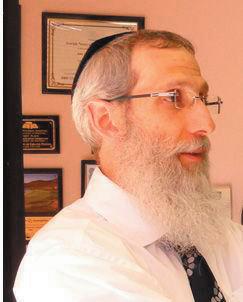
This was true then and certainly true today.
Fortunately, we are blessed to live in a country that gives us the freedom and encourages us to live as practicing Jews, enabling us to be “a light unto the nations.” JN
As expected, the first-degree homicide bill, SB 2650, was just the start of an onslaught of radical, restrictive bills — all intended to outlaw abortion and contraception by granting personhood to a fetus at every stage of development. Fertilized eggs, zygotes, embryos and fetuses would have full rights, privileges and protections as people under Arizona law.
From requiring burial or cremation for aborted remains and prohibiting abortions for genetic abnormalities, to banning medical schools and university
hospitals from referring or consulting on abortion and contraceptives, these bills are moving swiftly through the Arizona Legislature. They effectively remove protections in current law for ending a pregnancy or experiencing pregnancy loss. By designating a fetus as a person, this bill could turn anyone who is pregnant into a criminal.
Worse, a bill that provides full protection and immunity to a doctor who chooses to opt-out of treating a patient because of a religious objection and makes no exception or accommodation for a life-or-death medical emergency. The collateral damage from legislatures and courts intervening in reproductive health care and the tragic consequences of religious refusal of patient treatment abound across the country. Studies show a direct correlation between U.S. maternal mortality rate and lack of access to abortion and the full spectrum of reproductive health care. Not surprisingly, the United States has the highest rate of maternal mortality of any industrialized country.
As Arizonans, as Americans and especially, as Jews, it is imperative that we sound alarms and rise up to defeat these bills from becoming law. The battle goes beyond a woman’s right to bodily autonomy and reproductive justice. This is a fight to fend off an encroaching theocracy and protect our religious freedom as Jews. And that is not an alarmist overstatement.
Jewish law is clear that life begins at birth and that there is no personhood until birth, according to the Mishnah (Ohalot 7:6). Judaism also teaches that the mother’s life comes first and that the fetus may be sacrificed to save her life, unless the baby’s head has already emerged.
Our freedom to practice Judaism is being trampled by Arizona’s antiabortion personhood legislation. There is no subterfuge, no misunderstanding. The bills represent expressed and purposeful strategies to enshrine Christian beliefs into law and they blatantly violate the Establishment Clause of the First Amendment, which prevents the passage
of any law that gives preference to or forces belief in one religion.
Reproductive justice, the human right to have a child or not have a child, and to raise that child in a safe, viable, sustainable environment is the framework through which National Council of Jewish Women advocates for social justice. But the imminent danger posed by the extremist anti-abortion legislation demands we shift the paradigm and recognize what is happening through the lens of anti-Semitism.
The nexus between Christian ideologues, white supremacists and antiabortionists has been developing for 40 years. We saw it explode on Jan. 6 and we see it erupting in Arizona and other states. Unless we do everything in our power to stop this force, we might well face a new Inquisition as Marranos on the road to Gilead. JN
Civia Tamarkin, president of National Council of Jewish Women, Arizona, is an award-winning journalist and filmmaker of the documentary “Birthright: A War Story.”
RELIGIOUS LIFE TORAH STUDY
SHABBAT CANDLE LIGHTING FEB. 19 - 5:59 P.M. FEB. 26 - 6:05 P.M.
Rabbi Yossi Levertov is the director of Chabad of Scottsdale. FEB. 20 - 6:55 P.M. FEB. 27 - 7:01 P.M.
Find area congregations at jewishaz.com, where you can also find our 2020 Community Directory.
SHABBAT ENDS
PARSHAH TERUMAH EXODUS 25:1-27:19
12 FEBRUARY 19, 2021 JEWISH NEWS JEWISHAZ.COM
RABBI YOSSI LEVERTOV
around the country laughingly dismissed the bill as “Arizona craziness,” until I insisted this was no aberration — not in a state that boasts some of the most extremist anti-abortion laws in the county. Not in a state that long has been a test run for anti-abortion laws. Not in a state that was first to mandate 24-hour waiting periods, forced sonograms, a plethora of intrusive patient questionnaires and more required medical reports filed with the state than any other field in the practice of medicine.
TAMARKIN
CONTINUED FROM PAGE 10
Matchmaking during a pandemic
MICHELE CZOPP
y plan in 2020 was to create a private office space to meet and interview Jewish singles seeking a partner. Mitzvah Matchmaker, the complimentary Jewish matchmaking program I launched just a year earlier, was busier than ever.


But just as the installation of the glass walls and door were being finalized, the COVID-19 pandemic broke out.
Within a week, my two adult daughters flew home from their respective cities to work and study remotely for what ended up being many months. My special needs son stopped going to his day program, and our diamond and jewelry business was closed for six weeks. It felt like life for everyone came to a screeching halt.
Suddenly, my matchmaking website started getting inundated with requests for appointments. During the pandemic, people were isolated and lonely. But they also had more time not living in the rat race, and they realized they consciously wanted to prioritize seeking a life partner.

I had to pause for a while until I could reorganize my busy household’s new situation and work around everyone’s schedules. Finally, I started accepting interviews via video chat with singles all around the country.
Dating during a pandemic posed its own unique set of challenges. The singles would begin the dating process via text and then move to video chat. Some were hesitant to meet due to the pandemic and others were willing to take more risks.
COVID has been with us for all four seasons of the year. This has posed certain difficulties based on geographic location and climate in any given season. During mild months it was ideal for singles to meet at an outdoor coffee house, an

open-air restaurant or home patio — even at a park. However, when it was too hot or too cold, they had to get more creative with their date locations.
Changing my matchmaking methods during COVID has not been easy either. The very basis of my program is to get to know individuals by spending quality time with them while I fill out personal questionnaires. Singles talk more when they feel less of an automatic obligation to sit quietly and fill out paperwork. This allows me to really connect with them in order to help find a compatible match.
I am very intuitive, so I must admit that interviewing an individual over FaceTime is not as helpful as in person. I don’t get much of an impression of their personality, or what they want and don’t want. However, after they go on a date,
they usually follow up with me to give a report, which helps me to learn more about them and their dating style. There are some incredible, successful singles ranging anywhere from mid-20s to mid-80s who have reached out to me via referral. I am very discreet when sharing information about the singles I work with, and I never give out last names because I want the first meeting to be organic without any preconceived notions.
It is not all about the looks; you can fall in love with someone’s personality if you just give it a chance.
I have found that most younger singles miss out on meeting other great singles because they rule them out based on someone’s response to a text. They also often dismiss the possibility of a connection because they
eliminate someone after only one meeting when they should understand that most people don’t feel comfortable opening up right away. I encourage singles to be open to going on more than one date. Connections don’t always happen immediately. Sometimes it is shared experience that bonds people and brings them closer.
I have found my true passion in connecting people. Sometimes it has turned out to be a business contact and not necessarily a romantic match, but I feel there is always common ground when people from the same culture and religion get together.

My goal for next fall is to resume meeting singles in person in my newly renovated office space located at The Promenade in Scottsdale. Rabbi Pinchas Allouche of Congregation Beth Tefillah advised me to provide my matchmaking services complimentary since it’s a mitzvah. Pandemic or not, that’s what I’ll continue to do. JN

Michele Czopp is the owner of Mitzvah Matchmaker. For more information, visit mitzvahmatchmaker.com

SPECIAL SECTION
WONDERFUL WEDDINGS JEWISHAZ.COM JEWISH NEWS FEBRUARY 19, 2021 13
Interest-Free Loans for All Occasions
A new couple sits together talking and passing time. "COUPLES" BY BEST COUPLES IS LICENSED UNDER CC BY-SA 2.0
Love gave couples hope during Holocaust
 SOPHIE PANZER | CONTRIBUTING WRITER
SOPHIE PANZER | CONTRIBUTING WRITER
Regina Goodman and Sam Spiegel’s first meeting and early relationship had many hallmarks of ordinary teenage love: friendship, flirting and finding ways to be alone together.
Less ordinary is the fact that they met in a forced labor camp in Pionki, Poland, during the Nazi occupation.
The United States Holocaust Memorial Museum shared their love story during “Acts of Resistance: Love Stories and the Holocaust.” The Facebook Live event, which was hosted by museum historians Lindsay MacNeill and Edna Friedberg, was part of the Stay Connected project, a series of Holocaust education webinars created in the absence of in-person programming.
MacNeill said Goodman and Spiegel found ways to meet and talk at the water spigot even though men and women were supposed to be kept apart.
“One time, Sam said he received 12 lashes for talking to Regina, but he said it was worth it,” she said.
The young lovers were separated at the end of the war when the Germans loaded prisoners onto cattle cars and transported them to Auschwitz-Birkenau. Before they were forced into their gender-segregated sections of the concentration camp, Spiegel told Goodman to meet him in his hometown, Kozienice, if she survived. They were moved around various labor camps until liberation, when they returned to their respective hometowns to search for their families.
When Spiegel learned Goodman had survived, he sent a horse and buggy to bring her to Kozienice, and the two were married in a displaced persons camp in Germany shortly after. They stayed together for 70 years.
William Luksenberg and Helen Chilewicz met under similar circumstances, talking through a fence in the Gleiwitz labor camp between their barracks and writing letters to each other. Luksenberg promised Chilewicz that they would survive the war and he would marry her.
His prediction came true, and they wed in a displaced persons camp in 1947. During the ceremony, the rabbi recited a prayer in honor of their family members, most of whom had been murdered, and the couple bowed their
name of racial purity. Hedwig Gluckstein, however, refused to leave her Jewish husband, Georg Gluckstein, and their son Fritz. When father and son were rounded up by the Gestapo in Berlin, she joined hundreds of other Aryan women outside
deportations began, only 8,300 survived the Holocaust. And of that small number, half of them were in these types of intermarried families, they were married to somebody who was categorized as Aryan or they were categorized like Fritz as mixed race. So Hedwig and women like her, who stayed in these marriages, this act of love might have really saved the lives of thousands of people,” she said.
Many other couples did not make it through the war.
MacNeill said LGBTQ couples were especially vulnerable, and gay men were persecuted as enemies of the Reich.
Gad Beck and Manfred Lewin managed to have a romance in the midst of tragedy. They met in a Jewish youth group and signed up for air raid patrol so they could spend time alone together. MacNeill and Feinberg showed a booklet of love notes and sketches Lewin created for Beck, which now sits in the museum’s archives.
“Night exists for more than sleep which is why, my love, we stayed awake so often,” an excerpt reads.
When Lewin and his family were summoned for deportation, Beck donned a Hitler Youth uniform and demanded a meeting with him (he was protected by his halfAryan status.) Once he and Lewin were alone, he begged him to run away with him and go into hiding, but Lewin wouldn’t leave his family. They boarded a train east, and Beck never saw his love again; records show Lewin and his family were gassed at Auschwitz.
Friedberg posted a link to Lewin’s booklet for viewers to examine.
heads in grief. They later immigrated to the United States and became volunteers at USHMM.
MacNeill also told the story of an interfaith family whose love helped save Jewish members from deportation.
When the Nazis came to power, they encouraged Aryan women with Jewish husbands to divorce their spouses in the
the detention center in what became known as the Rosenstrasse Protest to demand the release of their loved ones.
Everyone in the center was eventually released. Although Georg and Fritz Gluckstein had to perform forced labor, they were not deported to death camps.
“Of the 73,000 Jews who were living in Berlin in October of 1941 when
“You can actually kind of do a flipbook, go through it and see the various drawings, the passionate, romantic, maybe not the most sophisticated teenage love poetry that’s in there, but something that just really drives home what this relationship meant as a solace and sustenance to these teenagers,” she said. JN
SPECIAL SECTION
WONDERFUL WEDDINGS
Sophie Panzer is a staff writer for the Jewish Exponent, a Jewish News-affiliated publication.
“NIGHT EXISTS FOR MORE THAN SLEEP WHICH IS WHY, MY LOVE, WE STAYED AWAKE SO OFTEN.”
14 FEBRUARY 19, 2021 JEWISH NEWS JEWISHAZ.COM
William and Helen Luksenburg at their wedding in 1947 COURTESY OF UNITED STATES HOLOCAUST MEMORIAL MUSEUM AND WILLIAM AND HELEN LUKSENBURG
always stunning
The Camby Ballroom, a beautifully appointed space adorned with crystal chandeliers, can accommodate up to 450 guests - perfect for bat mitzvahs, holiday parties, weddings and special events. Your guests will feel like royalty from the moment they step through the doors.



The Camby Hotel offers unique indoor and outdoor venues, equipped with the latest technology and exceptional professional services.
FOR MORE INFORMATION, CONTACT US AT EVENT S @THECAMB Y.COM 2401
JEWISHAZ.COM JEWISH NEWS FEBRUARY 19, 2021 15
E. Camelback Road, Phoenix, AZ 85016
Phoenix-area property owners grapple with politics of short-term rentals
NICOLE RAZ | STAFF WRITER
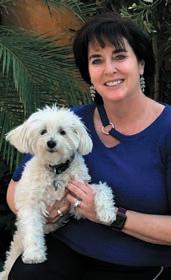

Living in a neighborhood sprinkled with short-term rentals hasn’t been so bad for Eric Awerbuch — for the most part. There have been two or three noisy nights in the roughly six years he’s lived in Park Scottsdale. He only had to call the police once, he said, when a group of rowdy renters in the home behind him — operated by a management company — were causing a ruckus at 3 a.m.

Scott Lorsch has a rental property near McDonald Road and the 101 in Scottsdale. The majority of the time, his renters don’t cause any issues for the neighborhood. And when they do, he hears about it. “My neighbors right across the street know me very well and keep an eye on my property,” he said. “They don’t want anybody bad and I don’t want anybody bad.”
But not everybody’s experiences have been as easy, which is why there are several bills taking aim at short-term rentals that dominate some neighborhoods in Scottsdale and Paradise Valley.

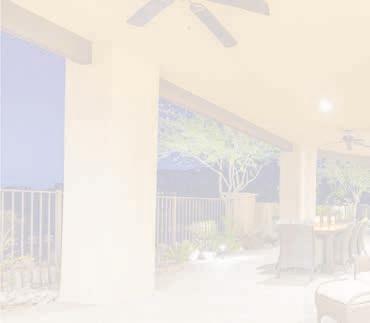
Arizona Rep. Aaron Lieberman (LD28) is attempting to repeal the state’s ban on allowing cities and towns to regulate short-term rentals. The ban was contextualized as a way to ensure the state is at the forefront of the sharing economy. “What we got is something quite different, which is companies buying houses and turning them into full-time boutique hotels and neighborhoods throughout the Valley,” Lieberman said.
Meanwhile, Rep. John Kavanaugh (LD-23), is looking to resolve the issue of “party houses and cars all over the street and noise all night” in a way that allows “reasonable regulation” by municipalities. He supports a state Senate bill that
would give cities the ability to enforce the occupancy limit — two adults per bedroom — and fine hosts who do not register or provide contact information with local jurisdictions as required by state law.

John Choi, a policy manager for Airbnb, released a statement supporting the Senate bill. “The vast majority of hosts in Arizona contribute positively to their neighborhoods and we look forward to supporting state and local officials in their efforts to develop sensible rules that preserve homeowners’ property rights and the economic benefits home sharing provides for Arizonians,” he said.

An Airbnb spokesman said the company proactively suspended or removed 50 listings across the state that had received complaints or violated its policies regarding parties. There are more than 25,000 Airbnb listings in Arizona.
A spokesman for Vrbo, which has more than 15,000 listings in the state, did not respond to a request for comment.
Gov. Doug Ducey enacted the ban on local oversight in 2016, and in 2019 he enacted legislation adding certain state restrictions on short-term rental operations. For example, the law prohibits rentals from holding special events that would otherwise require a permit or license, or using a rental as a retail space, restaurant or banquet hall.
C.J. Karamargin, Ducey’s spokesman, did not respond to a request for comment about the regulation of short-term rentals.
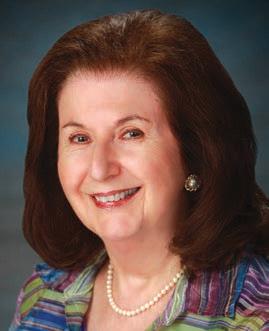

Lorsch said he’s on board with more regulations for short-term rentals — at least somewhat. “There’s people
taking advantage of the system,” he said, pointing to rental properties in Paradise Valley. “If you’re paying $2 to $4 million for a home, you don’t want to have somebody next door having a rager,” he said.
Being able to have a short-term rental property has been a boon to Lorsch, and provided a real income stream. He doesn’t want to see that opportunity taken away, but at the same time the rules of the playing field have not been clear, he said. There is a lack of enforcement of the limited guidelines in place.
In December, 33 mayors across the state sent a letter to the CEOs of Airbnb and Expedia Group, Inc. asking them to “immediately end lobbying activities designed to prevent reform” of the 2016 law, and outlined how short-term rentals have harmed citizens and neighborhoods.
Once peaceful neighborhoods have been turned into hotspots for unruly, noisy and large gatherings, and houses “are being gobbled up by investors,” the mayors said.
During the pandemic, short-term rentals have hosted “unsafe and unwelcome parties for hundreds of people,” the mayors said, and, in some communities, more than half of citizen police calls relate to problems with short-term rentals.
Paradise Valley Police Department spokesman Freeman Carney said the majority of calls the department receives
related to short-term rentals are noise complaints and parking issues. “When officers arrive to these calls, a variety of issues can be discovered, to include underage drinking, drug offenses and property damage,” he said.
Awerbuch said he is aware that some communities and neighborhoods have had a tougher time with short-term rentals than he has. He sees short-term rentals as a big benefit, saying tourism is good for the economy, and the houses he sees used are “immaculately kept,” boosting property values.
“I think if the owners [of short-term rentals] reached out to the people around the house, I think that would put a lot of people who are maybe having complaints at ease, instead of having to take drastic measures,” Awerbuch said. JN
SPECIAL SECTION
HOME DESIGN & REAL ESTATE 16 FEBRUARY 19, 2021 JEWISH NEWS JEWISHAZ.COM Let me be your “KOSHER CONNECTION” “I’ll treat you like family, because you are!” Amy Rosenthal 602-430-3158 AmyRosenthalRealtor@gmail.com www.AmyRosenthal.com One of the top 50 Realtors in Phoenix/Scottsdale as voted by Phoenix Magazine! BUYING? SELLING? LOCAL? LONG DISTANCE? Toby Weinstein Broker Associate Full service Real Estate needs, including property management I will make your next real estate transaction pleasant, productive, and profitable. Bus (480) 948-5554 • Cell (602) 228-0265 Tobyre4u@aol.com 7077 E. Marilyn Rd., Bldg. 4, Ste 130 Scottsdale, AZ All Real Estate Agents Are Not Alike!
Eric Awerbuch stands in the front of his home in the Park Scottsdale neighborhood on Sunday, Feb. 7, 2021. PHOTO BY MARINA AWERBUCH
Mirrors, mirrors on the wall
BARBARA KAPLAN

irrors can show more than a reflection. For designing a home, mirrors can have a unique and exciting affect that enhances and significantly changes a room.
When selecting the placement of a mirror, consider two things: function and aesthetic.

The most important consideration in deciding where a mirror should be is deciding what is being reflected. Whatever that thing is, with the help of a mirror, you will be seeing it twice in the room, so keep that in mind.
This functional element also becomes the aesthetic. So before hanging it, ask yourself if you want to reflect something in the room or make it possible for people to see themselves.
When deciding where to most effectively place and hang a mirror, remember the three S’s — size, shape and style. Additionally, if there is a frame, you need to select the material, color and texture. It also has to fit the space and the decor of the room. Then there are choices for the edge. Decide if you prefer a beveled edge, plain edge or custom matting touching the frame. There are many things to consider for even just one mirror.

Mirror as a material comes in many colors — clear, black, bronze, gray, rose and green, to mention just a few. I love using colored mirrors and even combine the colors in a design to be a frame for the mirror. They add wonderful surprise and interest.
Mirrors are thought to make rooms look larger and often brighter because they reflect light. They can add sparkle by themselves. And we can also mirror walls, ceilings, and architectural details for dramatic effect.

Mirrored pieces in all sizes, shapes
Mand color can be inserted on walls and furniture or mixed with other types of glass to create design accents and details. Mirror mixed with metal is particularly stunning because both materials are reflective, but create contrast and definition from each other.
There are many fun things to do with mirrors that are unexpected. Whenever I hang a mirror, I first determine if it can be turned, 45 degrees, 90 degrees or 180 degrees. It doesn’t have the same limitations of hanging a picture or photo in terms of the direction it must be hung. The shape can become the focal point.
Have you ever seen a mirrored floor?
It’s pretty spectacular. If not the whole floor, you can inlay small pieces of mirror into wood or tile.
I once had a client with a smaller-thanstandard piano that needed refinishing. We decided to mirror the entire piano instead, creating something truly unique. Recently, I used black mirror for a banister on a staircase. First, we built the posts and then mirrored them. We built black-mirrored étagères on either side of the fireplace in the adjoining room and also mirrored the fireplace. It gave the home a dramatic look.
In my home office, I mirrored the space between the work counter and upper cabinets. I sit opposite the mirror, and it reflects the garden window behind me. This way, I have the benefit of the window light behind me and the window’s reflection in front of me.
When you love your room and want to have double the pleasure, mirrors are the answer.
Remember, rooms have no feelings, you do. JN
Barbara Kaplan offers personal interior design guidance, ideas and solutions for free in her monthly Zoom class. Email Barbara@BarbaraKaplan.com to claim a seat or visit: BarbaraKaplan.com & YourZoomRoom.com.

SPECIAL SECTION
HOME DESIGN & REAL ESTATE JEWISHAZ.COM JEWISH NEWS FEBRUARY 19, 2021 17 FARI DESIGNS & REMODELING LLC www.faridesigns.com 480-522-8564 INTERIOR DESIGNER & GENERAL CONTRACTOR KOSHER KITCHENS • BATHS • WHOLE-HOUSE REMODELING • ADDITIONS Call Today For Complimentary Consultation Licensed • Bonded • Insured • ROC 299160 • 28 Years Experience • Award Winning Design & Construction Team • All Five-Star Google Reviews $1,000.00 OFF A Full Bathroom or Kitchen Remodel Valid through 02.28.2021 ISTOCK / GETTY IMAGES PLUS / HIKESTERSON ISTOCK / GETTY IMAGES PLUS ALEKSANDRA ZLATKOVIC
Former Pittsburgh synagogue finds renewed life as affordable housing
DAVID RULLO | CONTRIBUTING WRITER

If the ethos of the renovation of the building that once housed B’nai Israel synagogue could be summed up in three words, they might be “reduce, reuse, recycle.”
The former Pittsburgh, Pennsylvania, synagogue, built in 1923 and most recently home to the Urban League of Greater Pittsburgh Charter School, is set to find new life as apartments and, perhaps, a collaborative community arts and performance center.
Boston-based Beacon Communities plans to begin construction in late winter or early spring this year, converting the former school administration wing of the structure into 45 primarily affordable apartments and seven units offered at market rates.
“We are really approaching the entire development of the site with the lens of a regenerative community,” said Beacon Communities Development Director Courtney Koslow. “We’re thinking about how we can align our approach to reuse the building in a way that aligns with nature and addresses social justice and environmental concerns at the same time.”
To meet some of those concerns, the former structure will not be torn down; rather, Beacon will reuse the building and add an additional two stories, thereby limiting the environmental impact of the development.
The project is slated to be both Passive House and Enterprise Communities Certified, meaning that the apartments will be energy efficient in terms of heating and cooling and have a reduced ecological footprint.



The building will be at least net zero if not net positive in energy use, explained Koslow. That means that on average it will produce the same or more energy from renewable energy sources than it imports from external sources.
“We are striving to minimize the use of carbon-heavy materials, such as foam insulation, while at the same time providing affordable housing for families and individuals,” she said.
Beacon’s plans don’t stop with the building itself. Its leaders hope to turn the front lawn into a regenerative farm, repurpose trees that have fallen on the property and reuse some of the windows taken out of the schoolhouse as part of a future greenhouse. The developer even plans to use hempcrete, a bio-composite material that combines the inner woody core of hemp plants with other products, and natural clay plaster to renovate parts of the structure that have suffered water damage.
Beacon has partnered with Desmone Architects and local developers Michael Polite and David Motley who are finalizing financing, which, according to Koslow, includes funding from the URA, the Pennsylvania Housing Finance Authority, low-income tax credits and several other sources.


The developer’s plans do not incorporate the synagogue’s sanctuary/rotunda as part of the new apartments. For that part of the building, Pittsburgh native Sara Stock Mayo and transplant Alyson Bonavoglia — working with both Beacon and the Bloomfield Garfield Corporation — have other plans: a space for the arts.

When Bonavoglia, the former artistic director of the JCC of Greater Baltimore’s Gordon Center for Performing Arts, relocated to Pittsburgh, she said, she began
creating a network of people in the Pittsburgh arts community, including Mayo. The two got to talking about creating an arts venue when Mayo learned of the B’nai Israel development project and tentative plans to create a co-working space in the rotunda.
That concept didn’t make much sense to Mayo, who grew up in the synagogue and recalled the building’s rich history and beautiful architecture. Instead, she thought the rotunda might make a perfect location for an arts venue that could also provide space for social justice and interfaith events.
“There are several places around the country that we could use as models for ways to bring together many different things: the arts, different interfaith kinds of events, community building efforts, and some type of social justice and education,” Mayo said.
Bonavoglia, who often noticed the empty synagogue on her daily bike rides, thought it was a perfect site.
“Sara and I got very excited about the possibility of taking this beautiful space and really using it — although not as a synagogue — and really take advantage of the structure of the building, which is meant to hold people sitting, watching and also listening. It has amazing acoustics.”
The Bloomfield Garfield Corporation hired Bonavoglia and Mayo as consultants. They

have been having community conversations with arts and cultural organizations, social justice organizations and other nonprofits.
“We’re asking people what challenges they’re facing,” Bonavoglia said. “We’re interested to hear how people are functioning during the pandemic, what they are looking for in a venue, how this kind of venue could support their work moving forward.”
In addition to serving as a space for performing and visual arts, Bonavoglia and Mayo think it could be used for films, lectures and conferences, and could even be rented out for events like weddings and b’nei mitzvah celebrations.
The community might first notice a project though that doesn’t take place in the rotunda. Instead, local artists may have the opportunity to have their work printed on the wraps around the construction fencing at the site, much like that outside the Tree of Life building.
Mayo has other ideas as well.
“One of the first projects we’ve been talking about doing is called ‘Layer the Walls,’” she said. “It would be a theatrical presentation of a group that comes in and tells a story about immigration. It’s a story about a Jewish immigrant and an Irish immigrant.”
The two have been having community conversations to garner wide neighborhood support.

“Alyson and I come from a very strong Jewish place, but we want this to be a collaboration with a lot of different stories being told here,” Mayo said. “We’re working with the Bloomfield Garfield Corporation and starting dialogue with people who have seen a lot of gentrification in their neighborhood and we don’t want this to be another project that just serves part of the community.”
“The goal,” Bonavoglia said, “is to develop something that’s a true community asset.” JN
David Rullo is a staff writer for Pittsburgh Jewish Chronicle, a Jewish News-affiliated publication.
SPECIAL SECTION
HOME DESIGN & REAL ESTATE 18 FEBRUARY 19, 2021 JEWISH NEWS JEWISHAZ.COM Mountain top estate Kitchen with double appliances Guest House | Simple elegance Mid-Century Modern 5 Bed | 4 Bath | 4390 sF 14056 N Moon Mountain Trail Phoenix, ARIZONA 85023 Listed at $1,900,000 LAURA MOORE, REALTOR®, MCNE, PPS Coldwell Banker Realty 3113 E Lincoln Drive | Phoenix, AZ 85016 Cell: 602-750-1448 | Laura.Moore@azmoves.com MooreRealEstate.cbintouch.com Jodi Geiger – 602-321-4149 Mitchell Geiger – 480-236-5934 Email: jgeiger@hsmove.com Ov 30 ye s of p tn ship in l e & business www.thegeigers-azhomesales.com MATCHING YOUR LIVING SPACE TO YOUR LIFESTYLE
Celebrating Judaism at home is a pandemic silver lining
NICOLE RAZ | STAFF WRITER
The COVID-19-spurred lockdown was the push Na’amah Segal Karas needed to become more observant.
“I started trying to keep Shabbat in 2018, and we became more observant in 2019, but that was a very hectic year,” she said. “When COVID came, it was like Shabbat was the only thing that broke up that monotony.”
Stuck at home, many in the Jewish community began to engage with their faith differently in the past year.
“The pandemic has kind of empowered Judaism to come back home,” said Robin Meyerson, co-director of Project Inspire Arizona and chair of the Shabbos Project Arizona. Once restrictions on gatherings took effect, people approached her with questions about keeping a Jewish home. Others, with more time on their hands, wanted to learn about their Jewish heritage. “It’s everyone — it’s families, it’s elderly people,” she said, “They’re feeling so reinvigorated in learning.”
The first four months of the pandemic, Karas, her husband and her three children — ages 14, 8 and 1 — started learning Hebrew together on Aish.com, in addition to the virtual weekly learning she was already doing with Meyerson. Pre-pandemic, Project Inspire offered programming once a month. Now
Meyerson’s hosting multiple weekly virtual programs.

“In the last year, we have reached 10,000 people on Zoom,” she said, noting that virtual programming has also expanded her audience, since she is able to partner with other organizations and connect with people across the world. “A year ago, if you would have told me I would have reached 10,000 people, I would have laughed.”
Synagogues are different too. Instead of serving as a gathering place, they turned to virtual programming and services to encourage congregants to practice their Judaism at home.
Meri Thomason finds that engaging virtually with Rabbi Alicia Magal and the Jewish Community of Sedona and the Verde Valley, has meant becoming more intimately connected to her Judaism. She even created a dedicated corner for that purpose in her home.
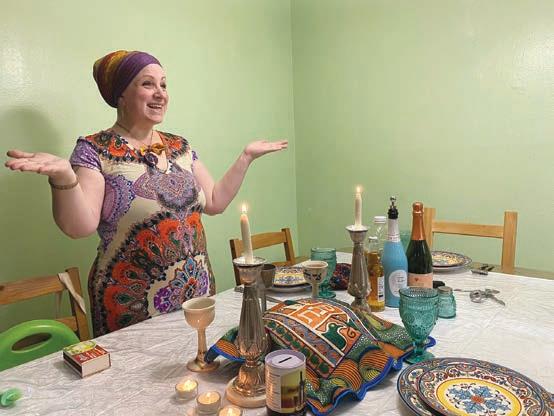
“For Zooming, the rabbi encourages us to have an area that is more sacred,” she said.


Even with COVID’s hardships, Chabad of Prescott Rabbi Elie Filler believes the pandemic has brought the idea of celebrating at home back into focus.


“Throughout history, what kept Judaism alive is Judaism at home,” he said.
Filler recounted that when he first moved to Prescott from New York and held a service in his home, someone asked, “Wow! In New
York, they do this every week?” To which he responded, “No, every day, three times a day.” He finds that people are pleased to discover all that can be done at home, up to and including making one’s own Shabbat candles.
Those revelations are what he called “a hidden blessing of COVID.” Even amid all the suffering, there may be a “deeper Jewish connection that people are gaining,” he said.
The pandemic has “radically transformed” Rabbi Dr. Shmuly Yanklowitz’s family Shabbat experience, he said.
“We haven’t gone to synagogue once since the pandemic broke,” he said. “We miss our communal prayer and our community gatherings, but we kind of double down on that during the week virtually and really embrace the reflective, regenerative and quieter family time on Shabbat.”
Yanklowitz noted he used to host community members for meals. “That part has totally stopped, which is a huge loss,” he said.
At the same time, the rest of the week he is able to enjoy the virtual classes and prayers at Valley Beit Midrash, where he is president and dean. He thinks
virtual offerings are here to stay.
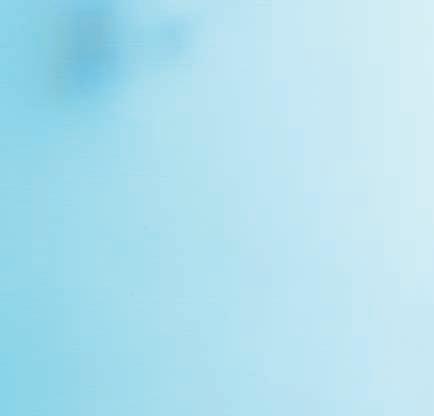

Meyerson agreed and is curious about the future balance of virtual and in-person meetings. “Some people can’t wait to get together back in person and other people do like the Zoom,” she said. “I think we’ll probably have a hybrid.”
Karas said keeping Shabbat is now a value and a habit — one she intends to build on post-pandemic. “Post-COVID — God willing tomorrow — my vision is that we’re just going to be as observant as we can be,” she said. “I have this firm belief that Shechina aligned all of this in my life for me, so that I would just end up in this direction, anyway,” she said. JN

Nominations
LIFESTYLES & CULTURE
FAITH JEWISHAZ.COM JEWISH NEWS FEBRUARY 19, 2021 19
close March 16
submit a nomination, please send an email to editor@jewishaz.com, including the name of the nominee and no more than 300 words explaining why this person or entity should be honored. Nominations will be anonymous and confidential, but we may use the description you send us in the magazine. This year, we’ll focus on the best healthcare the area has to offer, from doctors and nurses to pharmacies and hospitals. Jewish News is accepting nominations from our readers for our annual Best of Jewish Phoenix magazine. Nominations will be accepted for individuals and organizations, big hospitals and small health care facilities. Is there a dentist or physical therapist you think deserves plaudits? How about an extra caring surgeon or psychologist?
To
Na’amah Segal Karas welcomes Shabbat after lighting candles on Friday, Feb. 5, 2021.
Introducing fun flavors for unique Purim hamantaschen
JENNIFER STARRETT
Every Purim growing up, my grandma, mom, sister and I would spend time together baking loads of hamantaschen for everyone to enjoy. I can still picture all of us together — laughing, enjoying each other’s company and baking for hours.

Poppyseed and raspberry were usually in our mix of flavors. But these days, I love to experiment with new combinations.
S’more and citrus-flavored hamantaschen are definitely a bit more unique than the ones I made with my family, but experimenting is all part of the Purim fun. Why not go a little bit crazy in the flavor department?
And if you are looking for a simpler base that can also be adapted easily to gluten-free, you can find the ultimate hamantaschen recipe at jewphx.com. Happy noshin’!
S’MORES HAMANTASCHEN
We’ve been on a major s’mores kick at my house, so I wanted to challenge myself a little this year and was inspired to attempt to create s’mores hamantaschen. The filling needs to be chocolate and marshmallow, but the crushed graham crackers really take these over the top. Enjoy shaping a perfect s’more into a fun triangle for Purim.

INGREDIENTS
2 eggs at room temperature
½ cup butter or margarine (1 stick)
¾ cup sugar
1 teaspoon vanilla extract
½ teaspoon kosher salt
2 teaspoons baking powder
2 cups flour
½ cup crushed graham cracker (about 6 sheets)
Chocolate pieces, chunks or chips
Miniature marshmallows
Preheat oven to 350 F and line two baking sheets with parchment or wax paper. Using a hand or stand mixer, cream eggs, butter, sugar and vanilla extract. Once fully combined and smooth, gently mix in salt, baking powder and our ½ cup at a time. Mix in ½ cup of crushed graham crackers thoroughly, then smooth the dough with your hands. If the dough is too sticky to roll out, add additional our a tablespoon at a time. When the dough is ready, roll it out on a oured surface about ¼ inch thick. Using a round drinking glass or a circle cookie cutter, cut the dough into circles.
Fill the center of the circle with a few pieces of chocolate topped with a few miniature marshmallows.
Fold each into the shape of a triangle by pinching the ends together. Make sure each point is sealed.
Place on the lined baking sheets and bake cookies for 12 to 15 minutes.
CITRUS HAMANTASCHEN
Arizona winters are known for their sunshine and citrus, and even though it’s been a relatively dry year, our trees have produced lots of delicious citrus to enjoy. I thought I’d take some inspiration from the fresh fruit and add them into our hamantaschen this year by creating some lemon- and orange-flavored hamantaschen. These cookies are so bright and flavorful, that you may want to make an extra batch. I promise they’ll go quickly!
LEMON HAMANTASCHEN
INGREDIENTS
2 eggs at room temperature
½ cup butter or margarine (1 stick), softened
¾ cup sugar
1 teaspoon lemon extract
1 tablespoon lemon zest
½ teaspoon kosher salt
2 teaspoons baking powder
2½ cups flour
Lemon curd
Preheat oven to 350 F and line 2 baking sheets with parchment or wax paper. Using a hand or stand mixer, cream eggs, butter, sugar and lemon extract. Once fully combined and smooth, gently mix in salt, baking powder and lemon zest. Mix in our ½ cup at a time until combined thoroughly. Smooth the dough with your hands. If the dough is too sticky to roll out, add additional our a tablespoon at a time.
When the dough is ready, roll it out on a oured surface about ¼-inch thick. Using a round drinking glass or a circle cookie cutter, cut the dough into circles. Fill the center of the circle with about a teaspoon of lemon curd. Be careful not to over ll or the lling will boil out while baking.
Fold each into triangle shape by pinching the ends together making sure that each point is sealed.
Place on the lined baking sheets and bake cookies for 12 to 15 minutes.
ORANGE HAMANTASCHEN
INGREDIENTS
2 eggs at room temperature
½ cup butter or margarine (1 stick), softened
¾ cup sugar
½ teaspoon vanilla extract
3 tablespoons orange juice
1 tablespoon orange zest
½ teaspoon kosher salt
2 teaspoons baking powder
2 ½ cups flour
Orange jam or marmalade
Preheat oven to 350 F and line 2 baking sheets with parchment or wax paper. Using a hand or stand mixer, cream together eggs, butter, sugar, vanilla extract and orange juice.
Once fully combined and smooth, gently mix in salt, baking powder and orange zest. Mix in our ½ cup at a time until combined thoroughly. Smooth the dough with your hands. If the dough is too sticky to roll out, add additional our a tablespoon at a time. When the dough is ready, roll it out on a oured surface about ¼-inch thick. Using a round drinking glass or a circle cookie cutter, cut the dough into circles.
Fill the center of the circle with about a teaspoon of jam or marmalade. Be careful not to over ll or the lling will boil out while baking.
Fold each into triangle shape by pinching the ends together making sure that each point is sealed.
Place on the lined baking sheets and bake cookies for 12 to 15 minutes. JN
Jennifer Starrett is an events and marketing consultant. Visit jewphx.com, for more of her recipes and blogs.
LIFESTYLES & CULTURE
FOOD 20 FEBRUARY 19, 2021 JEWISH NEWS JEWISHAZ.COM
Featured Event
SUNDAY FEB. 21
Martin Pear JCC’s Drive-through Purim Parade: 11:30 a.m.-12:30 p.m. The Martin Pear JCC is holding the Allan J. Flader Community-Wide Purim Celebration. Entertainment will include BMX bike stunts, clowns, stilt walkers, aerialists and more. Attendees are asked to decorate their car and ride through in costume. The parade judges will pick winners for Best Decorated Car and Most Enthusiastic Car. Cost: Free, but registration is required at mpjcc.org/purim2021. The J will be collecting donations for the Jewish Family & Children’s Service’s Just 3 Things food pantry.

Events
SUNDAY, FEB. 14-MARCH 3
Greater Phoenix Jewish Film Festival: See 30+ films from the comfort of your home. Viewers will have 72 hours from the scheduled start time to begin watching a movie, and 48 hours after they start watching to finish it. Cost: $12 per film. See the film schedule and purchase tickets at gpjff.org.
Virtual Meetings, Lectures & Classes
SUNDAY, FEB. 21
Limmud AZ: 9:45 a.m.-2 p.m. This year Limmud AZ is a full-day virtual program. The day will be divided into individual sessions with a wide variety of subjects. Cost: $25 before Feb. 21 and $36 for same day registration. Visit limmudaz.org for more information.
From Ethiopia to Eretz Israel: 1 p.m. A Bureau of Jewish Education program presented by Naftali Aklum. Naftali was among the first group of Ethiopian Jews to make aliyah via Sudan. He works as an advocate for Ethiopian-Israelis, striving to raise awareness about Jewish-Ethiopian history and to strengthen Ethiopian-Israeli identity. Cost: $18. For more information, visit bjephoenix.org/programs/passages.
Anti-Semitism in the U.S.: 4 p.m. A virtual lecture with Jeffrey Gurock from Yeshiva University, hosted by the Center for Jewish Studies at Arizona State University. Examine how the world of organized sports has treated Jews, and what it says about the uncommon tolerance of American Jews in general. Cost: Free. For more information, visit jewishstudies.asu.edu/eckstein
MONDAY, FEB. 22
Voices Across the Generations: 10:30-11:30 a.m. A Bureau of Jewish Education class taught by Adena Bernstein Astrovsky, author of “Living Among the Dead: My Grandmother’s Holocaust Survival Story of Love and Strength.” Cost: Free. For more information, visit bjephoenix.org.
The Mediterranean Functional Lifestyle: 1-3 p.m. Join nationally recognized Scottsdale chef Nikos Ligidakis as he shares the ideas behind his cookbook and the healthy lifestyle it promotes. Cost: $10 for members, $15 for guests. For more information, visit jewishphoenix.regfox.com.
TUESDAY, FEB. 23
Emergent Judaism: 1-2 p.m. A virtual event presented by Rabbi Dr. Natan Margalit, hosted by Valley Beit Midrash. Judaism is a strong tradition that has survived for thousands of years. How do we do that?
Cost: $18. For more information, visit valleybeitmidrash.org.
SUNDAY, FEB. 28
Judaism and Climate Change: 10 a.m.-5:30 p.m. This day-long conference presented by the Judaism, Science and Medicine Group will feature 13 presentations by noted academics and rabbis on the topic. Cost: Free. Fore more information, visit jewishstudies.asu.edu/science.
Bridge to the Balkans: 2 p.m. A Bureau of Jewish Education program presented by Robyn Helzner, who will share captivating stories of Sephardic Jews expelled from Spain and Portugal in the 15th century who found safe haven in the cities of Dubrovnik, Split and Sarajevo. Cost: 18. For more information, visit bjephoenix.org/programs/ passages.
A Jewish Night on Broadway - Live: 6:30 p.m. Enjoy a sneak peek behind the scenes of Broadway and Jewish Night on Broadway as well as a live performance of showtunes by Cantor Angress and accompanist Dani Shraibman. To purchase tickets and sponsorships, visit bethelphoenix.com/JNOB-Live or call 602-944-3359.
MONDAY, MARCH 1
Educators Conference on the Holocaust: 5-7:30 p.m. Join the Bureau of Jewish Education for the upcoming 29th annual Educators Conference on the Holocaust. It is open to teachers and the community at large. Cost: Free. Visit bjephoenix.org for more information.
MONDAYS, JAN. 25-MARCH 1
The Writings and Wisdom of Rabbi Lord Jonathan Sacks Z’L: 12:15-1:30 p.m.
A Bureau of Jewish Education course taught by Andre Ivory. Rabbi Sacks, who died recently, possessed a world of wisdom that crossed denominational lines. Cost: $98. For more information visit bjephoenix.org.
TUESDAYS, THROUGH APRIL 8
39 Ways to Repair the World: In celebration of Rabbi Dr. Shmuly Yanklowitz's 39th birthday, he is teaching the 39 melachot over the year (one per week for 39 weeks). Each session will be between 15-20 minutes long on Tuesdays. Cost: Suggested $18 donation. For more information, visit valleybeitmidrash.org.
TUESDAYS, FEB. 16-MARCH 9
Beginner’s Guide to Kabbalah: 10-11 a.m. A Bureau of Jewish Education course taught by Rabbi Laibel Blotner. Explore the inspiring and meaningful guide to Jewish
mysticism. Cost: $60. For more information, visit bjephoenix.org.
TUESDAYS, JAN. 12-MAY 25
Introduction to Judaism: 7-9 p.m. Learn the basics of Judaism with Rabbi Stein Kokin. For more information or to register, visit bethelphoenix.com/ adult-education.
WEDNESDAYS
Happiness Hour: 11:30 a.m. An online class taught by Rabbi Pinchas Allouche that delves into texts and references culled from our traditions to address a relevant topic and draw uplifting life lessons from it. For more information or to join, visit cbtvirtualworld.com.
The Thirteen Petalled Rose: 1 p.m.
An online Kabbalah class that studies
“The Thirteen Petalled Rose” by Rabbi Adin Even-Israel Steinsaltz, focusing on the many foundational and transformational concepts of Kaballah and Jewish Mysticism and applying them to everyday life. For more information or to join, visit cbtvirtualworld.com.
WEDNESDAYS, FEB. 3-MARCH 10
Journey of the Soul: 7 p.m. Join Rabbi Mendel of the Jewish Learning Center for a new six-session course by the acclaimed Rohr Jewish Learning Institute that will answer a question which has occurred to every self-reflective person: What happens when we die? For more information or to register, contact Rabbi Mendel Vaisfiche at rabbimendel@chabadofscottsdale.org.
WEDNESDAYS, FEB. 3-APRIL 7
The Lights of Rav Kook: 11 a.m. Learn the foundational roots of Rabbi Avraham Yitzchak HaCohen Kook’s teachings and the soaring winds of his vision. Cost: $18. For more information visit valleybeitmidrash.org.
THURSDAYS, JAN. 14-MARCH 25
Israel and the Middle East Through the Lens of Ever-Changing Events in the US, Israel and the Middle East:
12:30 p.m.-2 p.m. A Bureau of Jewish Phoenix course taught by Meir Jolovitz. An examination of the implications of the election and current events. Cost: $130. For more information or to register, visit bjephoenix.org/courses/available-courses.
FRIDAYS, JAN. 8-FEB. 26
Shema Circle: Congregation Beth Israel invites members experiencing life transitions, losses, and difficult moments to share wisdom, stories, connection, and healing over Zoom. Space is limited. Visit https://cbiaz.org/shema-circle/ for more information.
FRIDAYS, JAN. 29-FEB. 26
Racism in America: The Democracy We Created & the Struggle to Fulfill the Vision: 10-11:30 a.m. A Bureau of Jewish Education course taught by Jay Roth. This class will explore the roots of racism and white supremacy beginning with the European era of colonialism and how those concepts continue to endure to today. Cost: $90. For more information or to register, visit bjephoenix.org/courses/available-courses.
SATURDAYS
Saturday Mindfulness Gatherings: 9:30 a.m.
Hosted by Hospice of the Valley. Join via Zoom. For more information and event link, visit vosjcc.org/j-at-home-adults.
SUNDAYS
Soul Study: 7:15 a.m. An online class exploring the secrets of the Tanya and Jewish mysticism, taught by Rabbi Pinchas Allouche.
Anxiety in the Modern World: 6 p.m. Learn the secrets of the Torah for living stress-free in the current environment in a virtual class with Rabbi Boruch, with Chabad of Oro Valley. For more information, visit chabadaz.com.
Shabbat
FRIDAYS
Shabbat at Beth El: 11-11:45 a.m. Celebrate Shabbat with songs, blessings and inspirational teachings. Rabbi Stein Kokin from Beth El Congregation will lead on the first Friday of every month. Special guests will be welcoming Shabbat during the remainder of the month. For more information or to join, visit bethelphoenix.com.
Welcome Shabbat: 11-11:45 a.m. Join the JFCS Virtual Center for Senior Enrichment each Friday for a soothing and inspiring program to welcome Shabbat. Each week a different guest host will lead the program with song and celebration. Cost: Free. For more information, visit jfcsaz.org/cse.
EVERY THIRD FRIDAY, JAN. 15-DEC. 31
Third Friday Shabbat: 7-8 p.m. The Desert Foothills Jewish Community Association hosts a virtual abbreviated Shabbat service followed by a program. Contact Andrea at 480-664-8847 for more information.
Seniors
WEDNESDAY, FEB. 24
Remember, Recreate, Heal: 1:30-3 p.m. JFCS virtual Center for Senior Enrichment presents a series of writing workshops designed to explore narrative, reflective and poetic writing techniques that encourage the uncovering of memories and creation of
CALENDAR
JEWISHAZ.COM JEWISH NEWS FEBRUARY 19, 2021 21 PHOTO COURTESY OF MARTIN PEAR JCC
SEE CALENDAR, PAGE 22
Upcoming Special Sections
CALENDAR
CONTINUED FROM PAGE 21
stories to share. For more information, visit jfcsaz.org.
MONDAYS
Dance Fusion with Michele Dionisio: 11 a.m.-noon. Presented by JFCS Center for Senior Enrichment. Cost: Free. For more information, visit jfcsaz.org/cse.
WEDNESDAYS
Chair Yoga with Zoe: 11-11:45 a.m. A guided class in yoga without having to get down on the floor. Presented by JFCS Center for Senior Enrichment. Cost: Free. For more information, visit jfcsaz.org/cse.
FRIDAYS, JAN. 15-MARCH 5


Wise Aging: 11:30 a.m.-1 p.m. A Bureau of Jewish Education course taught by Nan Pollinger. Wise Aging is designed specifically to meet the social, emotional and spiritual needs of Jewish seekers
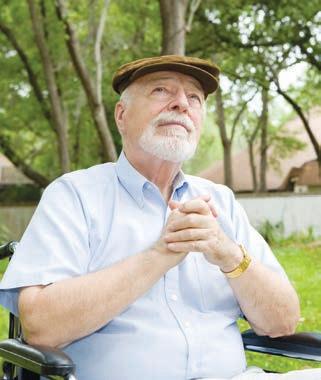
COMMUNITY
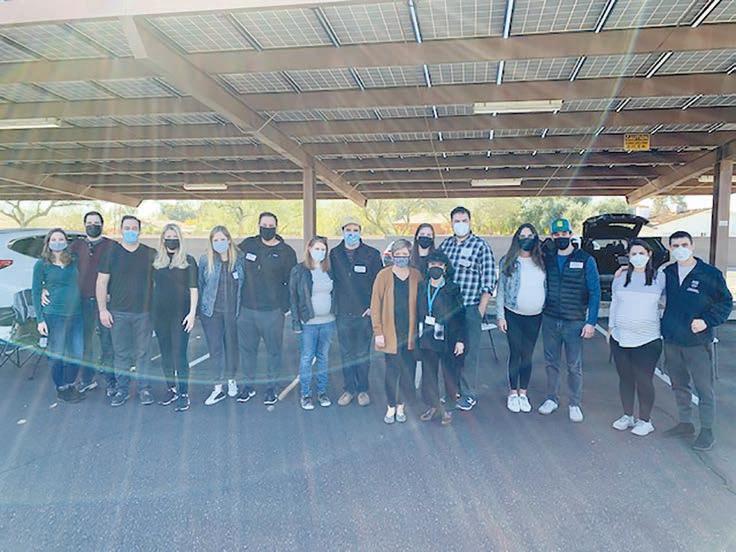
Senior Lifestyle
March 5
From home health aides to financial planners, independent living facilities to nursing homes, this is the perfect venue to showcase how your business can help older Jewish residents navigate these challenging times.
entering second adulthood. Explore the tools and resources to age wisely through the lens of Jewish wisdom. Learn positive ways to navigate a meaningful transition to the next chapter on life’s journey. Cost: $130. For more information or to register, visit bjephoenix.org/courses/available-courses.

FRIDAYS
Adult Chair Ballet Class: Noon-12:45 p.m. Join Jennifer Cafarella and Elaine Seretis from Ballet Theatre of Phoenix as they teach a ballet class that will help improve strength, flexibility, movement and balance. No prior dance experience required. Presented by the JFCS Virtual Center for Senior Enrichment. Cost: Free. For more information, visit jfcsaz.org/cse. JN
Car seat guru to the rescue
Expectant couples smile behind masks

Passover
5,
your support of the Jewish community by wishing them a Happy Passover! Camp & School Guide March 12 Showcase your camp and educational offerings to families looking for the perfect fit for their children. JEWISHAZ.COM
March
12, 19, 26 Show
REACH HIGHLY EDUCATED, AFFLUENT READERS IN THE VALLEY
your sales consultant to schedule your advertising at jlipson@jewishaz.com
Contact
Print | Digital | Target over 42,500 Jewish readers with a mix of print and digital. 22 FEBRUARY 19, 2021 JEWISH NEWS JEWISHAZ.COM
PHOTO COURTESY OF LINDA FELDMAN
Participants of BJE’s Jewish Baby University gather together briefly in person for a photo. They meet weekly on Zoom.
PHOTO COURTESY OF LINDA FELDMAN
The Car Seat Guy, Mitch Cohen, right, takes a break to pose for a photo at an outdoor gathering of Bureau of Jewish Education’s Jewish Baby University.
OBITUARY
MICHAEL WAYNE RUBINOFF
Michael Wayne Rubinoff, 70, died Feb. 3, 2021. He was born in Chicago and lived in Phoenix.
He is survived by his brother, Harry J. Rubinoff; his sister-in-law, Judith Engelman; his cousin, Mansha Hale Donohue; and his nephew, Marc Brian Rubinoff. Services were held at Beth El Cemetery.
Arrangements by Sinai Mortuary. JN
Ruth (Ruthie) Goldberg, age 92, of Scottsdale, passed away on Wednesday, Jan. 20, 2021. Ruth was born in Detroit, Michigan, on July 22,1928, to Sam and Eda Lefkowitz. She graduated from Central High. Ruth married Donald Goldberg at Temple Israel in Detroit in 1974. Ruth was a true “bulabusta,” wife, mother and most of all an AMAZING Bubby. She was very social, a phenomenal fundraiser, and was an active member of B’nai B’rith having been a former president of the Louis Stone Chapter. Ruth was involved in many organizations in Detroit and Phoenix and had a passion for life, friends, family, activities and learning.
Ruth is survived by her husband of 46 years, Donald Goldberg; sister-in-law, Marilyn; nieces, Beverly and Marla; daughter Linda Weisberg Lober; son, David Alan; and grandchildren, Erynn, Jason and Erika. Ruth will be deeply missed by friends, family and BEST FRIEND, granddaughter Erynn.
It would be an honor if memories and expressions of sympathy were shared at greenacresmortuary.net for the Goldberg family.

Diane Wise Sandler, beloved wife, mother, grandmother and sister, died from Lewy Body Dementia on Jan. 11, 2021, in Phoenix. Diane was born on Jan. 6, 1942, to Abraham and Rose Wise in Cleveland, Ohio. She is survived by her husband, Steve; daughters, Andrea Svetly (Andrew), Jennifer Sandler and Renee Shamblin (John); her grandchildren, Joseph, Conner and Grady Svetly, Blake and Landry Shamblin; sister, Edie Stoneman; and her cherished dog, Lucy. After graduating from North High School, she met and married Stephen Sandler in 1962, beginning a love affair and partnership that lasted over 58 years. Diane was devoted to her daughters and family. She was their strongest advocate in all their pursuits. She attended every football game, cheer competition or swim meet with a video camera on her shoulder to record all events for posterity.

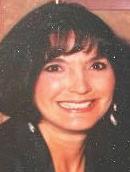
Diane also excelled in the workplace. She was a personnel consultant specializing in the legal field until she decided to take on the office management of the family business, Financial Management Services. After “retirement” she put her love of travel to use and formed “The Savvy Traveler” where she took great joy in planning vacations for friends and family. She passed on to her family the importance of “giving back” as an active supporter of many charitable organizations, especially those devoted to children and animals.
Diane was an avid sports fan, and over the past 40 years as a season ticketholder to ASU sports and the AZ Cardinals, she faithfully cheered on her teams (or read books while sitting in the stands) with Steve. She also was an event planner extraordinaire — not only planning family celebrations but designing and creating the décor as well. Diane loved adventure. She and her husband took over 35 cruises, and together they rode camels in the Middle East, went on safari in Africa, walked on glaciers in Alaska, toured the Great Wall in China, snorkeled in the Seychelles, and voyaged up the Amazon River. But her greatest pleasure was her family. She loved hosting gatherings in her home and spending time with her grandchildren.
Diane was a force of nature — her vibrant spirit, wit and love will be greatly missed. She and Steve planned to live out their lives together — she is gone way too soon.
In lieu of flowers, the family requests contributions in her honor be made to Desert Voices Oral Learning Center (desert-voices.org). Her two oldest grandchildren were students there and it held a special place in her heart.
Rose Jalowiec, 87, of Phoenix passed away on Feb. 3, 2021. She was a Holocaust survivor born in Poland and was a member of Congregation Or Tzion and the Phoenix Holocaust Association.
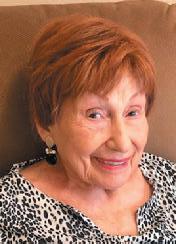
Rose, the wife of Sam Jalowiec (z’’l), will be remembered by her son, Phillip (Cheryl) Jalowiec; grandchildren, Joshua (Meghan) Jalowiec, Jeremy (Cheyenne) Jalowiec and Jennifer (Justin) Carrocci; and great-grandchildren, Brooks and Theo.
Services were held on Feb. 4 at Beth El Cemetery. Contributions in her memory may be made to the Phoenix Holocaust Association or Congregation Or Tzion.

MILESTONES
JEWISHAZ.COM JEWISH NEWS FEBRUARY 19, 2021 23
Contact Je rey Myers je reycmyers@bellsouth.net 843-327-3624 PHOENIX MEMORIAL Shalom I Section Lot 12A, Spaces 1 & 2 Includes Liners & Installation $ 10,000 for both
TWO PLOTS FOR SALE
SHARE YOUR ENGAGEMENT, WEDDING, BIRTH, BAR/BAT-MITZVAH ANNOUNCEMENT AND ANY OTHER SIMCHA ON BOTH JEWISHAZ.COM AND THE WEEKLY JEWISH NEWS ... FOR FREE . JEWISHAZ.COM JEWISHAZ.COM






24 FEBRUARY 15, 2021 JEWISH NEWS JEWISHAZ.COM From your favorite restaurant to the best bagel… Day camp to your favorite doctor… Shabbat service to best nonprofit organization... The winners are chosen by popular vote, so let your friends know it’s time to cast their ballot. As a business, share with your audience to help you win the title of “Best” in your category! SUBMIT YOUR READERS’ FORNOMINATIONSCHOICE THE BEST OF JEWISH PHOENIX! Nominations close March 16 Voting for the winners starts on March 26. Winners will be contacted in June and the results will be in the Best of Jewish News magazine. Go online and tell us what you think! readerschoice.jewishaz.com New Hometown Heroes Category Print | Digital |




























 SHANNON LEVITT | MANAGING EDITOR
SHANNON LEVITT | MANAGING EDITOR





















 SOPHIE PANZER | CONTRIBUTING WRITER
SOPHIE PANZER | CONTRIBUTING WRITER





















































